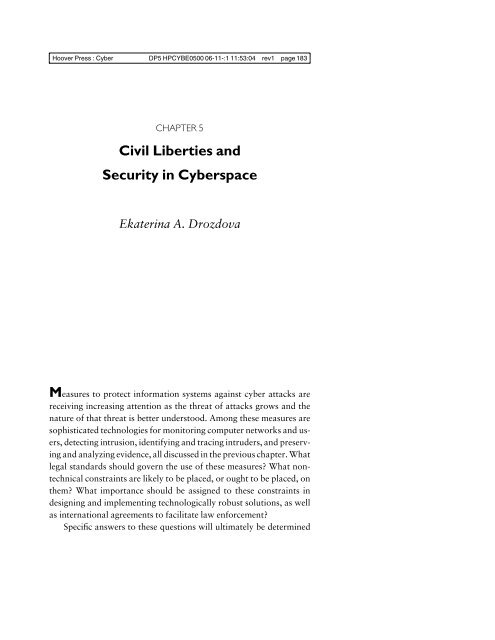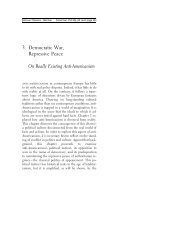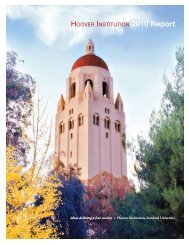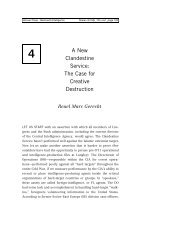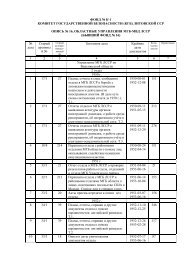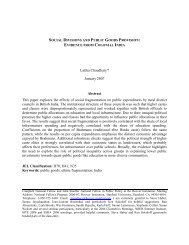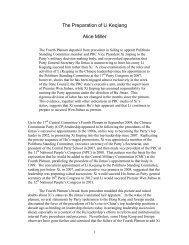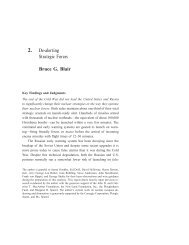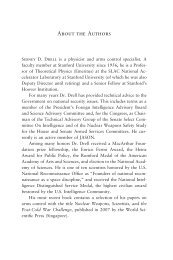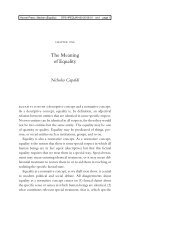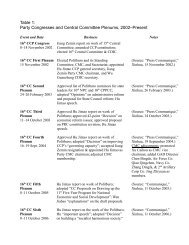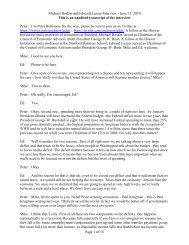Civil Liberties and Security in Cyberspace - Hoover Institution
Civil Liberties and Security in Cyberspace - Hoover Institution
Civil Liberties and Security in Cyberspace - Hoover Institution
Create successful ePaper yourself
Turn your PDF publications into a flip-book with our unique Google optimized e-Paper software.
<strong>Hoover</strong> Press : Cyber DP5 HPCYBE0500 06-11-:1 11:53:04 rev1 page 183<br />
CHAPTER 5<br />
<strong>Civil</strong> <strong>Liberties</strong> <strong>and</strong><br />
<strong>Security</strong> <strong>in</strong> <strong>Cyberspace</strong><br />
Ekater<strong>in</strong>a A. Drozdova<br />
Measures to protect <strong>in</strong>formation systems aga<strong>in</strong>st cyber attacks are<br />
receiv<strong>in</strong>g <strong>in</strong>creas<strong>in</strong>g attention as the threat of attacks grows <strong>and</strong> the<br />
nature of that threat is better understood. Among these measures are<br />
sophisticated technologies for monitor<strong>in</strong>g computer networks <strong>and</strong> users,<br />
detect<strong>in</strong>g <strong>in</strong>trusion, identify<strong>in</strong>g <strong>and</strong> trac<strong>in</strong>g <strong>in</strong>truders, <strong>and</strong> preserv<strong>in</strong>g<br />
<strong>and</strong> analyz<strong>in</strong>g evidence, all discussed <strong>in</strong> the previous chapter. What<br />
legal st<strong>and</strong>ards should govern the use of these measures? What nontechnical<br />
constra<strong>in</strong>ts are likely to be placed, or ought to be placed, on<br />
them? What importance should be assigned to these constra<strong>in</strong>ts <strong>in</strong><br />
design<strong>in</strong>g <strong>and</strong> implement<strong>in</strong>g technologically robust solutions, as well<br />
as <strong>in</strong>ternational agreements to facilitate law enforcement?<br />
Specific answers to these questions will ultimately be determ<strong>in</strong>ed
<strong>Hoover</strong> Press : Cyber DP5 HPCYBE0500 06-11-:1 11:53:04 rev1 page 184<br />
184 Ekater<strong>in</strong>a A. Drozdova<br />
by evaluat<strong>in</strong>g the specific measures or agreements proposed. But certa<strong>in</strong><br />
legal pr<strong>in</strong>ciples are broadly applicable, <strong>in</strong>clud<strong>in</strong>g the right to privacy,<br />
the protections aga<strong>in</strong>st self-<strong>in</strong>crim<strong>in</strong>ation <strong>and</strong> unwarranted<br />
searches <strong>and</strong> seizures, <strong>and</strong> the right to due process of law. These civil<br />
liberties are supported <strong>in</strong> <strong>in</strong>ternational law <strong>and</strong> guaranteed <strong>in</strong> vary<strong>in</strong>g<br />
forms by the national laws <strong>and</strong> <strong>in</strong>stitutions of many countries. An<br />
<strong>in</strong>ternational regime aga<strong>in</strong>st cyber crime <strong>and</strong> terrorism must operate<br />
with<strong>in</strong> the constra<strong>in</strong>ts of these pr<strong>in</strong>ciples, as def<strong>in</strong>ed by the legal frameworks<br />
of its States Parties.<br />
There is often a tension between protect<strong>in</strong>g civil liberties <strong>and</strong> enforc<strong>in</strong>g<br />
laws to ma<strong>in</strong>ta<strong>in</strong> public safety <strong>and</strong> order. States resolve this<br />
tension differently. Agree<strong>in</strong>g upon a common global level of protection<br />
of citizens’ rights is problematic ow<strong>in</strong>g to <strong>in</strong>ternational variance <strong>in</strong><br />
normative st<strong>and</strong>ards, legal practices, <strong>and</strong> political objectives. An <strong>in</strong>ternational<br />
common denom<strong>in</strong>ator could reduce the level of protections<br />
currently afforded <strong>in</strong> some states to the level of authoritarian states.<br />
In the <strong>in</strong>terest of promot<strong>in</strong>g <strong>in</strong>ternational cooperation <strong>and</strong> a timely<br />
response to the grow<strong>in</strong>g threat of cyber attacks, seek<strong>in</strong>g measures other<br />
than agreement on a specific level of protection is more likely to succeed.<br />
However, the differences <strong>in</strong> domestic values <strong>and</strong> rules may allow<br />
misuse of systems set up for prevent<strong>in</strong>g, track<strong>in</strong>g, or punish<strong>in</strong>g cyber<br />
crime. The diversion of technologies for illegitimate purposes—such<br />
as unwarranted surveillance—is a real threat, especially <strong>in</strong> countries<br />
that give little weight to civil liberty pr<strong>in</strong>ciples constra<strong>in</strong><strong>in</strong>g such activities.<br />
Countries may be tempted to circumvent legal constra<strong>in</strong>ts,<br />
moreover, when faced with a national security threat. Systems set up<br />
for <strong>in</strong>ternational cooperation would also <strong>in</strong>troduce new cyber vulnerabilities,<br />
s<strong>in</strong>ce they may be “hacked” or “cracked” <strong>and</strong> misused by<br />
crim<strong>in</strong>als or unauthorized persons. States should address these dangers<br />
<strong>in</strong> the course of develop<strong>in</strong>g forms of <strong>in</strong>ternational cooperation that<br />
extend to shar<strong>in</strong>g <strong>in</strong>formation <strong>and</strong> coord<strong>in</strong>at<strong>in</strong>g technology.<br />
This chapter considers the basic protective <strong>and</strong> reactive approaches<br />
to security <strong>in</strong> cyberspace <strong>in</strong> section 1 <strong>and</strong> the legal pr<strong>in</strong>ciples that apply
<strong>Hoover</strong> Press : Cyber DP5 HPCYBE0500 06-11-:1 11:53:04 rev1 page 185<br />
<strong>Civil</strong> <strong>Liberties</strong> <strong>and</strong> <strong>Security</strong> <strong>in</strong> <strong>Cyberspace</strong><br />
to security measures <strong>in</strong> sections 2 <strong>and</strong> 3. Issues concern<strong>in</strong>g search,<br />
seizure, <strong>and</strong> due process of law apply primarily to crim<strong>in</strong>al law enforcement.<br />
Threats to privacy, however, extend beyond law enforcement<br />
<strong>in</strong>to commercial <strong>and</strong> all other spheres of social life; privacy is<br />
discussed <strong>in</strong> section 2 <strong>in</strong> this broader context, <strong>and</strong> <strong>in</strong> section 3 the<br />
discussion turns to crim<strong>in</strong>al law <strong>and</strong> constra<strong>in</strong>ts on police behavior <strong>in</strong><br />
the course of <strong>in</strong>vestigations. Applicable aspects of the right to freedom<br />
of expression are addressed throughout. 1<br />
1. Protective <strong>and</strong> Reactive Approaches to<br />
<strong>Security</strong> <strong>in</strong> <strong>Cyberspace</strong><br />
185<br />
The world’s use of <strong>and</strong> dependence on <strong>in</strong>ternational computer networks<br />
fosters transnational computer crime. Sophisticated crim<strong>in</strong>als<br />
are able to operate from a distance <strong>and</strong> cover up or confuse the orig<strong>in</strong>s<br />
of their attacks. To respond to attacks <strong>in</strong> a timely <strong>and</strong> effective manner,<br />
system operators need to monitor user behavior <strong>and</strong> detect <strong>in</strong>trusions<br />
<strong>in</strong> real time. To identify suspects <strong>and</strong> launch <strong>in</strong>vestigations once a<br />
crime is detected, large-scale screen<strong>in</strong>g, trac<strong>in</strong>g, <strong>and</strong> analysis of electronic<br />
evidence may be required.<br />
Such methods dem<strong>and</strong> substantial commitments of technological,<br />
economic, <strong>and</strong> human resources. States, as well as commercial <strong>and</strong><br />
other public <strong>and</strong> private entities, face difficult trade-offs <strong>in</strong> allocat<strong>in</strong>g<br />
resources to fight cyber crime. Increased network security <strong>and</strong> <strong>in</strong>vestigative<br />
measures may come at the expense of network performance,<br />
privacy, <strong>and</strong> users’ desire for anonymity. States may also f<strong>in</strong>d their<br />
domestic laws, national security objectives, <strong>and</strong> political or economic<br />
priorities at odds with the conditions required for effective <strong>in</strong>ternational<br />
cooperation. Restrictions on cross-border flows of <strong>in</strong>formation<br />
imposed for polic<strong>in</strong>g purposes may impede electronic commerce <strong>and</strong><br />
other transactions.<br />
There are two basic approaches to security <strong>in</strong> cyberspace: a pro-<br />
1. On freedom of expression <strong>in</strong> cyberspace, see also Reno v. American <strong>Civil</strong><br />
<strong>Liberties</strong> Union, 521 U.S. 844 (1997).
<strong>Hoover</strong> Press : Cyber DP5 HPCYBE0500 06-11-:1 11:53:04 rev1 page 186<br />
186 Ekater<strong>in</strong>a A. Drozdova<br />
tective one <strong>and</strong> a reactive one. 2 Each is constra<strong>in</strong>ed <strong>in</strong> different ways.<br />
The protective approach aims to deter crim<strong>in</strong>als through measures<br />
that deny access or make a potential target less vulnerable to an attack.<br />
This approach is focused on defense. It <strong>in</strong>volves design<strong>in</strong>g more secure<br />
Internet protocols, <strong>in</strong>troduc<strong>in</strong>g trusted routers <strong>and</strong> virtual private networks,<br />
<strong>and</strong> utiliz<strong>in</strong>g firewalls, encryption, automated <strong>in</strong>trusion-detection<br />
systems, <strong>and</strong> other security measures. The reactive approach seeks<br />
to deter the threat through effective <strong>in</strong>vestigation, prosecution, <strong>and</strong><br />
punishment. 3 Both approaches <strong>in</strong>volve monitor<strong>in</strong>g <strong>and</strong> diagnos<strong>in</strong>g<br />
abnormal <strong>and</strong> unauthorized activity. The protective approach favors<br />
automation as well as oversight <strong>and</strong> decisionmak<strong>in</strong>g by computer<br />
security experts. The reactive one depends more heavily on the participation<br />
of law enforcement <strong>and</strong> requires end user–oriented (rather than<br />
anonymous) traffic analysis, which may be as <strong>in</strong>trusive as scann<strong>in</strong>g of<br />
attached files, keyword searches, <strong>and</strong> content filter<strong>in</strong>g for signs of<br />
potential breaches of crim<strong>in</strong>al law. Real-time <strong>in</strong>vestigative capabilities<br />
may extend to creat<strong>in</strong>g embedded data collection <strong>in</strong>frastructures <strong>and</strong><br />
modify<strong>in</strong>g hardware <strong>and</strong>/or software to provide for confidential law<br />
enforcement access to bus<strong>in</strong>ess, governmental, <strong>and</strong> private computer<br />
networks. 4<br />
The two approaches can be complementary. Their relative weights<br />
depend on the preferences <strong>and</strong> capabilities of implement<strong>in</strong>g parties.<br />
Although there are significant obstacles to achiev<strong>in</strong>g high levels of<br />
cyber security, 5 the protective approach is likely to facilitate greater<br />
2. As discussed at the Conference on International Cooperation to Combat Cyber<br />
Crime <strong>and</strong> Terrorism, <strong>Hoover</strong> <strong>Institution</strong>, Stanford University, December 6–7, 1999.<br />
Neither exhaustive nor mutually exclusive, the two approaches provide a useful framework<br />
for evaluat<strong>in</strong>g with respect to civil liberties the technical <strong>and</strong> legal measures<br />
aga<strong>in</strong>st cyber crime.<br />
3. Whitfield Diffie, presentation at the Stanford Conference, December 6–7,<br />
1999.<br />
4. Forms of this are be<strong>in</strong>g implemented by the Russian <strong>and</strong> U.S. governments, as<br />
discussed <strong>in</strong> the privacy section below.<br />
5. These obstacles <strong>in</strong>clude budget constra<strong>in</strong>ts, technical complexity, unclear responsibilities,<br />
security weaknesses <strong>in</strong> products, lack of awareness, lack of good security<br />
tools, lack of competent <strong>in</strong>formation security personnel, privacy <strong>and</strong> ethics issues, <strong>and</strong>
<strong>Hoover</strong> Press : Cyber DP5 HPCYBE0500 06-11-:1 11:53:04 rev1 page 187<br />
<strong>Civil</strong> <strong>Liberties</strong> <strong>and</strong> <strong>Security</strong> <strong>in</strong> <strong>Cyberspace</strong><br />
security with less <strong>in</strong>trusion. The reactive approach may be more effective<br />
<strong>in</strong> cases of <strong>in</strong>adequate defense <strong>and</strong> <strong>in</strong> safeguard<strong>in</strong>g users who are<br />
unable to afford, or unwill<strong>in</strong>g to implement, sufficient protective measures.<br />
However, the reactive approach is <strong>in</strong>herently more <strong>in</strong>trusive <strong>and</strong><br />
more threaten<strong>in</strong>g to civil liberties.<br />
2. Privacy <strong>and</strong> Data Protection<br />
Among the issues considered <strong>in</strong> this chapter, privacy <strong>in</strong> cyberspace is<br />
the most controversial <strong>and</strong> publicly debated. Privacy concerns not only<br />
the context of law enforcement but also day-to-day bus<strong>in</strong>ess practices<br />
<strong>and</strong> an <strong>in</strong>dividual’s ability to control the treatment of personal data<br />
made available <strong>in</strong> electronic format or accumulated dur<strong>in</strong>g Internet<br />
use. Commercial exploitation of personal data without consent is<br />
already lead<strong>in</strong>g to enhanced legal protections for privacy. The enforcement<br />
of such protections will raise the issue of the desirability of us<strong>in</strong>g<br />
protective versus reactive methods, lead<strong>in</strong>g to discussions of what can<br />
be done to ensure that any method used will protect privacy <strong>in</strong>terests<br />
aga<strong>in</strong>st unwanted <strong>in</strong>trusion.<br />
The Value, Law, <strong>and</strong> Status of Privacy Protection<br />
187<br />
Privacy is not an absolute, well-def<strong>in</strong>ed, or uniformly protected value.<br />
Individuals, organizations, <strong>and</strong> societies have traditionally sacrificed<br />
some privacy <strong>in</strong> exchange for greater security, economic ga<strong>in</strong>, or convenience.<br />
Trade-offs between privacy <strong>and</strong> <strong>in</strong>trusion (by government,<br />
<strong>in</strong>dustry, etc.) reflect the different historical <strong>and</strong> social contexts <strong>in</strong><br />
which they were made. The norm of privacy is l<strong>in</strong>ked to an <strong>in</strong>dividual’s<br />
<strong>in</strong>dependence, dignity, <strong>and</strong> <strong>in</strong>tegrity.<br />
legal or regulatory issues. Yet computer security requires a comprehensive <strong>and</strong> <strong>in</strong>tegrated<br />
approach, which extends throughout the entire <strong>in</strong>formation life cycle <strong>and</strong><br />
recognizes the <strong>in</strong>terdependencies of <strong>in</strong>formation security with such factors as system<br />
management, organizational management, legal issues, <strong>and</strong> physical <strong>and</strong> personnel<br />
security. See Dorothy E. Denn<strong>in</strong>g, Information Warfare <strong>and</strong> <strong>Security</strong> (Read<strong>in</strong>g, Mass.:<br />
ACM Press <strong>and</strong> Addison-Wesley Longman, 1999), pp. 396, 397–400.
<strong>Hoover</strong> Press : Cyber DP5 HPCYBE0500 06-11-:1 11:53:04 rev1 page 188<br />
188 Ekater<strong>in</strong>a A. Drozdova<br />
Protection of privacy has evolved historically through <strong>in</strong>ternational<br />
<strong>and</strong> domestic law. Privacy is a fundamental human right recognized<br />
by the 1948 Universal Declaration of Human Rights <strong>and</strong> many<br />
other <strong>in</strong>ternational <strong>and</strong> regional <strong>in</strong>struments <strong>and</strong> treaties. 6 The Universal<br />
Declaration proclaims that “no one shall be subjected to arbitrary<br />
<strong>in</strong>terference with his privacy, family, home or correspondence,<br />
nor to attacks upon his honour <strong>and</strong> reputation,” <strong>and</strong> “everyone has<br />
the right to the protection of the law aga<strong>in</strong>st such <strong>in</strong>terference or<br />
attacks.” 7 It also states that “everyone has the right to freedom of<br />
op<strong>in</strong>ion <strong>and</strong> expression; this right <strong>in</strong>cludes freedom to hold op<strong>in</strong>ions<br />
without <strong>in</strong>terference <strong>and</strong> to seek, receive <strong>and</strong> impart <strong>in</strong>formation <strong>and</strong><br />
ideas through any media <strong>and</strong> regardless of frontiers.” 8 These provisions<br />
create the basic <strong>in</strong>ternational law framework for the right to<br />
privacy, which extends to cyberspace. 9<br />
On the national level, privacy is protected through a comb<strong>in</strong>ation<br />
of constitutional <strong>and</strong> legislative <strong>in</strong>struments <strong>and</strong> self-regulation.<br />
Nearly every country <strong>in</strong> the world recognizes a constitutional right to<br />
privacy, <strong>in</strong>clud<strong>in</strong>g at least the rights to <strong>in</strong>violability of home <strong>and</strong> secrecy<br />
of communications. Some recently written constitutions, such<br />
as those of South Africa <strong>and</strong> Hungary, conta<strong>in</strong> rights to access <strong>and</strong><br />
control of one’s personal <strong>in</strong>formation. In countries where the right to<br />
6. The Universal Declaration of Human Rights, UN GA Res. 217A (III) (1948)<br />
<strong>and</strong> the International Covenant on <strong>Civil</strong> <strong>and</strong> Political Rights, UN GA Res. 2200A<br />
(XXI) (1966, entry <strong>in</strong>to force 1976), oblige state signatories to adopt legislative <strong>and</strong><br />
other measures to protect aga<strong>in</strong>st unlawful <strong>and</strong> arbitrary <strong>in</strong>terference with <strong>and</strong> attacks<br />
on privacy by state authorities or natural or legal persons. The 1950 European Convention<br />
on Human Rights (Council of Europe, European Treaties, ETS No. 5) is a<br />
b<strong>in</strong>d<strong>in</strong>g treaty that obligates its signatories to protect privacy <strong>in</strong>terests, such as the<br />
right to private <strong>and</strong> family life, home, <strong>and</strong> correspondence,<strong>and</strong> enforces this obligation<br />
through the European Court of Human Rights. A state, person, nongovernmental<br />
organization or group of <strong>in</strong>dividuals claim<strong>in</strong>g to be a victim of a violation by a<br />
contract<strong>in</strong>g party may apply to the court for redress.<br />
7. Universal Declaration of Human Rights, art. 12.<br />
8. Ibid., art. 19.<br />
9. Ste<strong>in</strong> Schjolberg, Chief Judge, Moss Byrett City, Norway, “Legal Mechanisms<br />
for International Cooperation—Protect<strong>in</strong>g Privacy <strong>and</strong> Other Rights,” presentation<br />
at the Stanford Conference, December 6–7, 1999.
<strong>Hoover</strong> Press : Cyber DP5 HPCYBE0500 06-11-:1 11:53:04 rev1 page 189<br />
<strong>Civil</strong> <strong>Liberties</strong> <strong>and</strong> <strong>Security</strong> <strong>in</strong> <strong>Cyberspace</strong><br />
189<br />
privacy is not explicitly guaranteed by the constitution—the United<br />
States, Irel<strong>and</strong>, <strong>and</strong> India, for example—this right has been established<br />
through other legal provisions or judicial rul<strong>in</strong>gs. 10<br />
The advent of <strong>in</strong>formation technology provided a new context <strong>in</strong><br />
which to consider privacy <strong>and</strong> a new legal impetus for the protection<br />
of personal data. The first modern legislation on collect<strong>in</strong>g <strong>and</strong> h<strong>and</strong>l<strong>in</strong>g<br />
personal data emerged <strong>in</strong> the early 1970s <strong>in</strong> Sweden (1973) <strong>and</strong><br />
the United States (1974). 11 The Organization for Economic Cooperation<br />
<strong>and</strong> Development (OECD) was the first <strong>in</strong>ternational organization<br />
to issue a policy, “Guidel<strong>in</strong>es on the Protection of Privacy <strong>and</strong><br />
Transborder Flows of Personal Data,” adopted <strong>in</strong> 1980 (see Figure 1).<br />
The OECD’s policy applies to personal data, whether <strong>in</strong> the public or<br />
private sectors, that pose a danger to privacy <strong>and</strong> <strong>in</strong>dividual liberties<br />
because of their nature or the manner <strong>in</strong> which they are processed <strong>and</strong><br />
used. 12<br />
Development of <strong>in</strong>ternational st<strong>and</strong>ards cont<strong>in</strong>ued <strong>in</strong> the 1980s<br />
<strong>and</strong> 1990s. The Council of Europe (COE) adopted a “Convention for<br />
the Protection of Individuals with regard to the Automatic Process<strong>in</strong>g<br />
of Personal Data” (1981) <strong>and</strong> “Guidel<strong>in</strong>es on the Use of Computerized<br />
10. The 1995 U.S. Department of State review on human rights practices reported<br />
that 110 countries guaranteed the right to privacy <strong>in</strong> their constitutions. See David<br />
Banisar, “U.S. State Department Reports Worldwide Privacy Abuses,” excerpts from<br />
“U.S. Department of State Country Reports on Human Rights Practices for 1995,”<br />
Privacy International, available at www.privacy.org/pi/reports/1995_hranalysis.<br />
html. The 1999 survey by the Electronic Privacy Information Center (EPIC) (“Privacy<br />
<strong>and</strong> Human Rights: An International Survey of Privacy Laws <strong>and</strong> Developments”)<br />
updated this count to nearly every country <strong>and</strong> reported that at least 55 countries do<br />
not have constitutional provisions on privacy but establish protections through other<br />
legal means. For a discussion of privacy law <strong>in</strong> the U.S., see Robert Gellman, “Does<br />
Privacy Law Work?” <strong>in</strong> Philip E. Agre <strong>and</strong> Marc Rotenberg, eds., Technology <strong>and</strong><br />
Privacy: The New L<strong>and</strong>scape (Cambridge, Mass.: MIT Press, 1998), pp. 193–218.<br />
11. Ulrich Sieber, “Legal Aspects of Computer-Related Crime <strong>in</strong> the Information<br />
Society—COMCRIME-Study—prepared for the European Commission,” Version<br />
1.0 (January 1, 1998), Section I.B.2.a, “Protection of Privacy,” pp. 62–64.<br />
12. “Implement<strong>in</strong>g the OECD Privacy Guidel<strong>in</strong>es <strong>in</strong> the Electronic Environment:<br />
Focus on the Internet,” Group of Experts on Information <strong>Security</strong> <strong>and</strong> Privacy, OECD,<br />
DSTI/ICCP/REG(97)6/FINAL, pp. 6–10.
<strong>Hoover</strong> Press : Cyber DP5 HPCYBE0500 06-11-:1 11:53:04 rev1 page 190<br />
International<br />
Organizations National Legislation<br />
COE Recommendation<br />
<br />
2000 —<br />
1998 — Greece<br />
1996 —<br />
F<strong>in</strong>l<strong>and</strong> Italy South Africa<br />
EU Directive<br />
Sweden<br />
1994 — New Zeal<strong>and</strong><br />
Belgium Switzerl<strong>and</strong> Spa<strong>in</strong> Slov./Czec. Hungary<br />
1992 —<br />
UN Guidel<strong>in</strong>es<br />
1990 —<br />
Portugal<br />
Slovenia<br />
COE Guidel<strong>in</strong>es 1988 — Irel<strong>and</strong><br />
F<strong>in</strong>l<strong>and</strong><br />
Japan Netherl<strong>and</strong>s<br />
1986 —<br />
1984 —<br />
United K<strong>in</strong>gdom<br />
San Mar<strong>in</strong>o<br />
1982 — Australia Canada<br />
COE Convention<br />
Icel<strong>and</strong> Israel<br />
OECD Guidel<strong>in</strong>es 1980 —<br />
Luxembourg<br />
1978 — Denmark<br />
Germany<br />
France Norway Austria<br />
1976 —<br />
1974 — United States<br />
Sweden<br />
1972 —<br />
Fig. 1. Development of law for privacy protection <strong>in</strong> cyberspace. Updated<br />
from Ulrich Sieber, “Legal Aspects of Computer-Related Crime <strong>in</strong><br />
Information Society” (1998).
<strong>Hoover</strong> Press : Cyber DP5 HPCYBE0500 06-11-:1 11:53:04 rev1 page 191<br />
<strong>Civil</strong> <strong>Liberties</strong> <strong>and</strong> <strong>Security</strong> <strong>in</strong> <strong>Cyberspace</strong><br />
191<br />
Personal Data Flow” (1989). 13 The United Nations (UN) produced<br />
“Guidel<strong>in</strong>es for the Regulation of Computerized Personal Data Files”<br />
(1989). 14 These documents establish pr<strong>in</strong>ciples of m<strong>in</strong>imum privacy<br />
guarantees for personal <strong>in</strong>formation at all stages of its collection,<br />
storage, <strong>and</strong> dissem<strong>in</strong>ation by other parties. They also create new<br />
rights for “data subjects”—those whose data are collected <strong>and</strong> manipulated<br />
by government agencies, bus<strong>in</strong>esses, <strong>and</strong> so on—requir<strong>in</strong>g that<br />
accurate <strong>and</strong> up-to-date personal <strong>in</strong>formation must be obta<strong>in</strong>ed fairly<br />
<strong>and</strong> lawfully, used only for the orig<strong>in</strong>al, <strong>in</strong>tended purpose, <strong>and</strong> destroyed<br />
after the purpose is achieved. Data subjects are granted the<br />
right to access <strong>and</strong> amend <strong>in</strong>formation about them.<br />
The 1995 European Union (EU) Data Protection Directive established<br />
a regulatory framework for free movement of personal data,<br />
while allow<strong>in</strong>g <strong>in</strong>dividual EU countries to exercise their unique approaches<br />
to implementation. “Data subjects” are guaranteed the right<br />
to know where the data orig<strong>in</strong>ated, the right to have <strong>in</strong>accurate data<br />
corrected, the right of appeal <strong>in</strong> the case of unlawful process<strong>in</strong>g, <strong>and</strong><br />
the right to deny permission to use data under certa<strong>in</strong> circumstances. 15<br />
The 1999 COE Recommendation provides guidel<strong>in</strong>es for the protection<br />
of privacy on the Internet. 16 Whereas the COE <strong>and</strong> UN guidel<strong>in</strong>es<br />
13. The Convention (ETS no. 108, January 28, 1981, Entry <strong>in</strong>to force: October<br />
1, 1985) has s<strong>in</strong>ce become law <strong>in</strong> over twenty countries. See “Privacy <strong>and</strong> Human<br />
Rights: An International Survey of Privacy Laws <strong>and</strong> Developments,” Electronic Privacy<br />
Information Center (EPIC) <strong>in</strong> association with Privacy International (1999), p.<br />
10.<br />
14. UN GA Res. 44/132, 44 UN GAOR Supp. (No. 49) at 211, UN Doc. A/44/<br />
49 (1989).<br />
15. Directive 95/46/EC of the European Parliament <strong>and</strong> of the Council “On the<br />
protection of <strong>in</strong>dividuals with regard to the process<strong>in</strong>g of personal data <strong>and</strong> on the<br />
free movement of such data.” “Council Def<strong>in</strong>itively Adopts Directive on Protection<br />
of Personal Data,” European Commission Press Release: IP/95/822, July 25, 1995.<br />
16. Recommendation no. R(99)5 of the Committee of M<strong>in</strong>isters to Member States<br />
for the “Protection of Privacy on the Internet: Guidel<strong>in</strong>es for the protection of <strong>in</strong>dividuals<br />
with regard to the collection <strong>and</strong> process<strong>in</strong>g of personal data on <strong>in</strong>formation<br />
highways,” adopted by the Committee of M<strong>in</strong>isters at the 660th meet<strong>in</strong>g of the<br />
M<strong>in</strong>isters’ Deputies, February 23, 1999. The text of the Recommendation can be<br />
viewed at http://www.coe.fr/cm/ta/rec/1999/99r5.htm.
<strong>Hoover</strong> Press : Cyber DP5 HPCYBE0500 06-11-:1 11:53:04 rev1 page 192<br />
192 Ekater<strong>in</strong>a A. Drozdova<br />
are recommendations, the EU Directives are b<strong>in</strong>d<strong>in</strong>g: member states<br />
must adopt them <strong>in</strong>to their domestic law.<br />
Currently, nearly fifty countries <strong>and</strong> jurisdictions have enacted or<br />
are <strong>in</strong> the process of enact<strong>in</strong>g privacy laws, designed to ensure compatibility<br />
with <strong>in</strong>ternational st<strong>and</strong>ards, to address past government<br />
abuses, <strong>and</strong>/or to promote electronic commerce. 17<br />
Threats to Privacy <strong>in</strong> <strong>Cyberspace</strong><br />
Privacy <strong>in</strong> cyberspace is threatened by bus<strong>in</strong>esses <strong>and</strong> other entities<br />
that collect <strong>and</strong> manipulate personal data, by crim<strong>in</strong>als who steal such<br />
data or stalk people over the Internet, <strong>and</strong> by governments that pursue<br />
surveillance or allow <strong>in</strong>trusive law enforcement practices. Sophisticated<br />
electronic capabilities to collect, analyze, manipulate, <strong>and</strong> dissem<strong>in</strong>ate<br />
<strong>in</strong>formation, as well as to enable track<strong>in</strong>g, surveillance, <strong>and</strong><br />
<strong>in</strong>terference with communications, create unprecedented challenges to<br />
privacy. Such technologies are becom<strong>in</strong>g more effective, available, <strong>and</strong><br />
affordable <strong>in</strong>ternationally. At the same time, globalization <strong>and</strong> grow<strong>in</strong>g<br />
dependence on <strong>in</strong>formation technology <strong>in</strong> all spheres of society<br />
have led to a dramatic <strong>in</strong>crease <strong>in</strong> the level of electronically compiled<br />
<strong>and</strong> transmitted personal data. The differences <strong>in</strong> domestic legal st<strong>and</strong>ards<br />
<strong>and</strong> practices also endanger private data transmitted over <strong>in</strong>ternational<br />
networks. Even if one state has robust privacy laws, it cannot<br />
currently guarantee equivalent levels of protection once the data flow<br />
beyond its borders. Gaps <strong>in</strong> protection will be created to the extent<br />
that market forces undervalue privacy, laws <strong>and</strong> law enforcement fail<br />
to keep up with technological capabilities, <strong>and</strong> <strong>in</strong>ternational discrepancies<br />
underm<strong>in</strong>e domestic levels of protection.<br />
17. Electronic Privacy Information Center (EPIC) Privacy Survey (1999), p. v. For<br />
specific <strong>in</strong>formation on laws <strong>and</strong> <strong>in</strong>struments for the protection of privacy <strong>and</strong> personal<br />
data <strong>in</strong> various countries, see “Inventory of Instruments <strong>and</strong> Mechanisms Contribut<strong>in</strong>g<br />
to the Implementation <strong>and</strong> Enforcement of the OECD Privacy Guidel<strong>in</strong>es<br />
on Global Networks,” OECD, DSTI/ICCP/REG(98)12/FINAL; <strong>and</strong> “Excerpts on<br />
Privacy from U.S. State Department Human Rights Guides,” prepared by Global<br />
Internet Liberty Campaign, available at http://www.gilc.org/privacy/.
<strong>Hoover</strong> Press : Cyber DP5 HPCYBE0500 06-11-:1 11:53:04 rev1 page 193<br />
<strong>Civil</strong> <strong>Liberties</strong> <strong>and</strong> <strong>Security</strong> <strong>in</strong> <strong>Cyberspace</strong><br />
193<br />
The U.S. Federal Trade Commission found that privacy policies,<br />
posted on many commercial websites, did not provide sufficient protection<br />
for on-l<strong>in</strong>e consumers. 18 Bus<strong>in</strong>esses track on-l<strong>in</strong>e behavior, sell<br />
personal <strong>in</strong>formation, <strong>and</strong> misuse personal profiles built on the basis<br />
of f<strong>in</strong>ancial, medical, <strong>and</strong> other sensitive <strong>in</strong>formation. 19 Employers’<br />
<strong>in</strong>trusion <strong>in</strong>to electronic communications of employees <strong>in</strong> the workplace<br />
is another area of concern. Privacy protection is often subord<strong>in</strong>ated<br />
to property rights of employers as the providers of their employees’<br />
electronic communication services. In the United States, for<br />
example, legislation prohibits employers from eavesdropp<strong>in</strong>g on the<br />
private telephone conversations of their employees at work, but no<br />
similar protection extends to electronic mail communications. 20<br />
Crim<strong>in</strong>als take advantage of deficiencies <strong>in</strong> the protection of sensitive<br />
<strong>in</strong>formation transmitted <strong>and</strong> accumulated <strong>in</strong> electronic form.<br />
Identity theft is among the fastest-grow<strong>in</strong>g cyber crimes; <strong>in</strong> the U.S.<br />
alone, it has <strong>in</strong>creased more than 300 percent, from 7,868 cases <strong>in</strong><br />
1997 to 30,115 <strong>in</strong> 1999. Pedophiles entice victims <strong>in</strong> Internet chat<br />
rooms <strong>and</strong> use electronic communications to arrange actual meet<strong>in</strong>gs.<br />
Spurned suitors forge v<strong>in</strong>dictive e-mails <strong>in</strong>vit<strong>in</strong>g rape. 21 Stalkers identify<br />
victims on the Internet <strong>and</strong> threaten them physically. 22<br />
The spread <strong>and</strong> grow<strong>in</strong>g severity of cyber crime require greater<br />
security <strong>and</strong> better law enforcement. 23 Where security <strong>and</strong> polic<strong>in</strong>g<br />
methods are <strong>in</strong>trusive, achiev<strong>in</strong>g these objectives may dem<strong>and</strong> some<br />
18. Schjolberg, “Legal Mechanisms for International Cooperation.”<br />
19. See Jeffrey Rosen, “The Eroded Self,” New York Times Magaz<strong>in</strong>e, April 30,<br />
2000, pp. 46–53.<br />
20. See Ann Beeson, “Privacy <strong>in</strong> <strong>Cyberspace</strong>: Is Your E-mail Safe from the Boss,<br />
the SysOp, the Hackers, <strong>and</strong> the Cops?” American <strong>Civil</strong> <strong>Liberties</strong> Union, Cyber-<br />
<strong>Liberties</strong> (1996), available at http://www.aclu.org/issues/cyber/priv/privpap.html.<br />
21. See Stephen J. Lukasik, “Combat<strong>in</strong>g Cyber Crime <strong>and</strong> Terrorism,” presentation<br />
at the Technical Sem<strong>in</strong>ar, Center for International <strong>Security</strong> <strong>and</strong> Cooperation,<br />
Stanford University, May 2, 2000; Lukasik cites identity theft figures reported by the<br />
Social <strong>Security</strong> Adm<strong>in</strong>istration.<br />
22. Sam Howe Verhovek, “Creators of Anti-Abortion Web Site Told to Pay Millions,”<br />
New York Times, February 3, 1999, p. A11.<br />
23. Chap. 1 of this volume.
<strong>Hoover</strong> Press : Cyber DP5 HPCYBE0500 06-11-:1 11:53:04 rev1 page 194<br />
194 Ekater<strong>in</strong>a A. Drozdova<br />
limitations of privacy. Should governments treat Internet communications<br />
like a phone call, paper correspondence, or a discussion <strong>in</strong> a<br />
public place? Responses to this question determ<strong>in</strong>e the extent of permissible<br />
<strong>in</strong>fr<strong>in</strong>gements, as well as the specific rules govern<strong>in</strong>g law<br />
enforcement functions, <strong>and</strong> responses vary among states. Even the<br />
relatively strong European Convention on Human Rights makes exceptions<br />
to the exercise of the right to privacy “<strong>in</strong> accordance with the<br />
law,” when it is “necessary <strong>in</strong> a democratic society <strong>in</strong> the <strong>in</strong>terests of<br />
national security, public safety or the economic well-be<strong>in</strong>g of the country,<br />
for the prevention of disorder or crime, for the protection of health<br />
or morals, or for the protection of the rights <strong>and</strong> freedoms of others.” 24<br />
Although the burden of proof to establish the need for this exception<br />
rests with the potential <strong>in</strong>truder, the scope of the exception is very<br />
broad. Many national laws have similar provisions. Such breadth can<br />
lead to abuse if police attempt to assume excessive powers or governments<br />
pursue unlawful surveillance.<br />
Caspar Bowden of the United K<strong>in</strong>gdom’s Foundation for Information<br />
Policy Research has warned about the implications of improv<strong>in</strong>g<br />
detection, prosecution, <strong>and</strong> prevention of cyber crime at the expense<br />
of privacy:<br />
There are now traffic-analysis tools commercially available to law<br />
enforcement which can take telephone number logs <strong>in</strong> mach<strong>in</strong>e-readable<br />
form <strong>and</strong> draw “friendship trees,” which show the group<strong>in</strong>g<br />
<strong>and</strong> relationships between parties call<strong>in</strong>g each other <strong>in</strong> time, <strong>and</strong> can<br />
match patterns of association automatically us<strong>in</strong>g sophisticated artificial<br />
<strong>in</strong>telligence programm<strong>in</strong>g.<br />
There is enormous potential for law enforcement <strong>in</strong> <strong>in</strong>creased use<br />
of traffic analysis, but there are a number of fundamental dist<strong>in</strong>ctions<br />
between traffic analysis of telephony, <strong>and</strong> Internet traffic—especially<br />
<strong>in</strong> a fully wired Information Society. The Internet Protocol (“IP”)<br />
abolishes any mean<strong>in</strong>gful dist<strong>in</strong>ction between domestic <strong>and</strong> foreign<br />
communications <strong>in</strong>telligence. A well-funded national communications<br />
<strong>in</strong>telligence agency, which already captures large quantities of<br />
24. European Convention on Human Rights, art. 8.
<strong>Hoover</strong> Press : Cyber DP5 HPCYBE0500 06-11-:1 11:53:04 rev1 page 195<br />
<strong>Civil</strong> <strong>Liberties</strong> <strong>and</strong> <strong>Security</strong> <strong>in</strong> <strong>Cyberspace</strong><br />
both traffic <strong>and</strong> content data <strong>and</strong> has the organization to process it<br />
<strong>and</strong> <strong>in</strong>tegrate it effectively with other forms of <strong>in</strong>telligence gather<strong>in</strong>g,<br />
presents an enormous temptation to government simply to leverage<br />
that capability for wider domestic coverage.<br />
Intelligence-<strong>in</strong>tegrated traffic analysis is phenomenally corrosive<br />
of civil liberties. If government was <strong>in</strong> a position to know which<br />
websites you visit, what you buy onl<strong>in</strong>e, the e-mail addresses of those<br />
who e-mail you <strong>and</strong> those you have e-mailed, <strong>and</strong> analyze <strong>and</strong> archive<br />
that <strong>in</strong>formation without h<strong>in</strong>drance, there is potential for an unprecedentedly<br />
serious abuse of power. 25<br />
195<br />
The threat of systematic government <strong>in</strong>trusion <strong>in</strong>to electronic communications<br />
has already received attention around the world. Russia’s<br />
Federal <strong>Security</strong> Bureau (FSB) is implement<strong>in</strong>g an Internet surveillance<br />
system that requires all Internet service providers (ISPs) to enable<br />
rout<strong>in</strong>e FSB monitor<strong>in</strong>g of communications. 26 Russian human rights<br />
advocates report that many of the country’s 350 ISPs have already<br />
been forced to comply, endanger<strong>in</strong>g secrecy of communications <strong>and</strong><br />
other civil liberties of users <strong>and</strong> persons whose sensitive <strong>in</strong>formation<br />
may be transmitted over the Internet. 27 The U.S. Federal Bureau of<br />
25. Caspar Bowden, “Unprecedented Safeguards for Unprecedented Capabilities,”<br />
Foundation for Information Policy Research (FIPR), United K<strong>in</strong>gdom, presentation<br />
at the Stanford Conference, December 6–7, 1999.<br />
26. This System to Conduct Investigations <strong>and</strong> Field Operations <strong>in</strong> Russia is<br />
known as SORM, which st<strong>and</strong>s for Sistema Operativno-Rozysknykh Meropriiatii.In<br />
an open letter to the Russian government, representatives of the Russian Internet<br />
community <strong>and</strong> organized Internet societies stated that “particular danger nests <strong>in</strong> the<br />
Technical Requirements for SORM. Today’s version of legislation puts the control<br />
for the presence of a jury or prosecutor’s warrant <strong>in</strong> the h<strong>and</strong>s of the same authority<br />
that is do<strong>in</strong>g wiretapp<strong>in</strong>g. This approach cannot guarantee <strong>in</strong> practice to Internet users<br />
their constitutional rights.” The letter can be viewed <strong>in</strong> Russian <strong>and</strong> downloaded <strong>in</strong><br />
English at http://www.libertarium.ru/eng/. See also Moscow Libertarium, http://<br />
www.libertarium.ru/, for a discussion <strong>and</strong> background documents on SORM.<br />
27. “Russia’s <strong>Security</strong> Agency Spies on Internet,” Features <strong>and</strong> Commentary,<br />
HPCwire, February 25, 2000. Article 23 of the Constitution of the Russian Federation<br />
(1993) guarantees the right to privacy of correspondence, telephone communications,<br />
mail, cables, <strong>and</strong> other communications. Article 24 forbids gather<strong>in</strong>g, stor<strong>in</strong>g, us<strong>in</strong>g,<br />
<strong>and</strong> dissem<strong>in</strong>at<strong>in</strong>g <strong>in</strong>formation on the private life of any person without his or her<br />
consent, <strong>and</strong> obligates state <strong>and</strong> local authorities to provide to each citizen access to<br />
any materials directly affect<strong>in</strong>g his rights <strong>and</strong> liberties unless otherwise stipulated by
<strong>Hoover</strong> Press : Cyber DP5 HPCYBE0500 06-11-:1 11:53:04 rev1 page 196<br />
196 Ekater<strong>in</strong>a A. Drozdova<br />
Investigation (FBI) is us<strong>in</strong>g a similar wiretapp<strong>in</strong>g system with specialized<br />
software that can scan millions of e-mails a second. When deployed,<br />
the system must be connected directly <strong>in</strong>to ISPs’ computer<br />
networks, thus giv<strong>in</strong>g the government potential access to all customers’<br />
digital communications. Typical Internet wiretaps last about forty-five<br />
days, after which the FBI removes the equipment. Critics contend that<br />
the system is open to abuse, rais<strong>in</strong>g dire privacy <strong>and</strong> security concerns.<br />
28<br />
Threaten<strong>in</strong>g surveillance has also taken place on the <strong>in</strong>ternational<br />
scale. The United States, the United K<strong>in</strong>gdom, Canada, Australia, <strong>and</strong><br />
New Zeal<strong>and</strong> allegedly engage <strong>in</strong> selective mult<strong>in</strong>ational screen<strong>in</strong>g of<br />
telephone, fax, satellite, <strong>and</strong> Internet communications for foreign <strong>in</strong>telligence<br />
purposes. This system, known as Echelon, supposedly l<strong>in</strong>ks<br />
computers around the world to capture large volumes of <strong>in</strong>formation,<br />
<strong>and</strong> to sort <strong>and</strong> analyze it through sophisticated keyword searches <strong>and</strong><br />
artificial <strong>in</strong>telligence aids. The <strong>in</strong>formation collected is compiled <strong>and</strong><br />
routed accord<strong>in</strong>g to requests of the participat<strong>in</strong>g parties. 29 Allegations<br />
of unlawful surveillance <strong>and</strong> violation of privacy, <strong>in</strong> the United States<br />
<strong>and</strong> abroad, have been raised <strong>in</strong> regard to this system. 30<br />
law. The Law on Operational Investigative Activity permits FSB, the Tax Police, <strong>and</strong><br />
the M<strong>in</strong>istry of Interior to monitor telephone <strong>and</strong> other types of communication<br />
pursuant to a court order. Zakon Operativno-Rozisknoi Deiatelnosti (The Law on<br />
Operational Investigative Activity), no. 144-FZ, (8/12/1995). See also Cather<strong>in</strong>e Newcombe,<br />
“Russian Federation,” <strong>in</strong> Craig M. Bradley, ed., Crim<strong>in</strong>al Procedure: A Worldwide<br />
Study (Durham, N.C.: Carol<strong>in</strong>a Academic Press, 1999), pp. 294–95.<br />
28. Neil K<strong>in</strong>g Jr. <strong>and</strong> Ted Bridis, “FBI’s System to Covertly Search E-mail Raises<br />
Privacy, Legal Issues,” Wall Street Journal, July 11, 2000. See also testimony of James<br />
X. Dempsey, Senior Staff Counsel, Center for Democracy <strong>and</strong> Technology, on “Internet<br />
<strong>Security</strong> <strong>and</strong> Privacy,” before the United States Senate Judiciary Committee,<br />
May 25, 2000.<br />
29. See Echelon Watch, http://www.aclu.org/echelonwatch/, adm<strong>in</strong>istered by<br />
the American <strong>Civil</strong> <strong>Liberties</strong> Union <strong>in</strong> conjunction with the Free Congress Foundation,<br />
the Electronic Privacy Information Center, Cyber-Rights <strong>and</strong> Cyber-<strong>Liberties</strong> (UK),<br />
<strong>and</strong> the Omega Foundation. “An Appraisal of Technologies of Political Control,”<br />
European Parliament, Scientific <strong>and</strong> Technological Options Assessment, Work<strong>in</strong>g<br />
Document (January 6, 1998), Luxembourg, available at http://cryptome.org/stoaatpc.htm.<br />
30. See: “Memo on International Electronic Surveillance Concerns” addressed to
<strong>Hoover</strong> Press : Cyber DP5 HPCYBE0500 06-11-:1 11:53:04 rev1 page 197<br />
<strong>Civil</strong> <strong>Liberties</strong> <strong>and</strong> <strong>Security</strong> <strong>in</strong> <strong>Cyberspace</strong><br />
197<br />
There are <strong>in</strong>herent dangers <strong>in</strong> a system for advanced monitor<strong>in</strong>g,<br />
search<strong>in</strong>g, track<strong>in</strong>g, <strong>and</strong> analyz<strong>in</strong>g of communications. Though it<br />
could be very helpful aga<strong>in</strong>st cyber crime <strong>and</strong> terrorism, it would also<br />
provide participat<strong>in</strong>g governments, especially authoritarian governments<br />
or agencies with little accountability, tools to violate civil liberties<br />
domestically <strong>and</strong> abroad. Correspondence of <strong>in</strong>nocent people<br />
could be <strong>in</strong>tercepted <strong>and</strong> people could be repressed as a result. Systems<br />
set up for <strong>in</strong>ternational polic<strong>in</strong>g of cyberspace could also be hacked or<br />
misused by an <strong>in</strong>sider to underm<strong>in</strong>e a participat<strong>in</strong>g government or to<br />
damage the <strong>in</strong>terests of a state. The technology <strong>and</strong> know-how, which<br />
will be developed <strong>and</strong> provided to less technologically advanced countries<br />
<strong>in</strong> the course of <strong>in</strong>ternational cooperation, could be used to enhance<br />
domestic surveillance <strong>and</strong> suppression by governments that disregard<br />
human rights.<br />
These threats exist now <strong>and</strong> they are likely to exp<strong>and</strong> <strong>in</strong> the future<br />
as advanced computer network<strong>in</strong>g becomes pervasive <strong>in</strong> public <strong>and</strong><br />
private lives <strong>and</strong> methods for <strong>in</strong>tercept<strong>in</strong>g <strong>and</strong> analyz<strong>in</strong>g <strong>in</strong>formation<br />
become more sophisticated, widespread, <strong>and</strong> affordable. Integrat<strong>in</strong>g<br />
attributed personal data from different systems could make comprehensive,<br />
detailed profiles available for retrieval, manipulation, <strong>and</strong><br />
abuse. Abuses by the private sector may range from <strong>in</strong>undation with<br />
unsolicited targeted advertisements to various forms of covert discrim<strong>in</strong>ation,<br />
such as denial of employment on the basis of prior knowledge<br />
of health conditions, or denial of medical services on the basis of<br />
f<strong>in</strong>ancial debts. Such conglomerations of data would be vulnerable to<br />
the United States Congress by the American <strong>Civil</strong> <strong>Liberties</strong> Union, Center for Democracy<br />
<strong>and</strong> Technology, Eagle Forum, Electronic Frontier Foundation, Electronic Privacy<br />
Information Center, <strong>and</strong> Free Congress Foundation, January 7, 1999, available<br />
at http://www.aclu.org/congress/l060899a.html; “Lawsuit Seeks Memos on Surveillance<br />
of Americans; EPIC Launches Study of NSA Interception Activities,” Electronic<br />
Privacy Information Center Press Release, December 3, 1999, available at<br />
http://www.epic.org/open_gov/foia/nsa_suit_12_99.html; “French Prosecutor<br />
Starts Probe of U.S. Spy System,” Reuters, July 4, 2000, reported at http://<br />
news.excite.com/news/r/000704/08/news-france-usa-dc.
<strong>Hoover</strong> Press : Cyber DP5 HPCYBE0500 06-11-:1 11:53:04 rev1 page 198<br />
198 Ekater<strong>in</strong>a A. Drozdova<br />
identity theft <strong>and</strong> other cyber crimes. As for possible government<br />
abuses, the totalitarian regimes of the twentieth century—with ubiquitous<br />
<strong>in</strong>formers, government controls over all spheres of society, <strong>and</strong><br />
egregious violations of human rights—should serve as a rem<strong>in</strong>der <strong>and</strong><br />
a warn<strong>in</strong>g.<br />
Privacy Protection Modes <strong>and</strong> Constra<strong>in</strong>ts on<br />
Measures Aga<strong>in</strong>st Cyber Crime<br />
Several models of data protection have emerged—public enforcement,<br />
sector-specific regulation, <strong>and</strong> self-regulation—reflect<strong>in</strong>g different legal<br />
approaches to privacy. Methods are also used <strong>in</strong> comb<strong>in</strong>ation. The<br />
EU, Australia, Hong Kong, New Zeal<strong>and</strong>, Canada, <strong>and</strong> many countries<br />
of Central <strong>and</strong> Eastern Europe have adopted the first model, <strong>in</strong><br />
which a public official (a commissioner, ombudsman, or registrar)<br />
enforces a comprehensive data protection law. This official monitors<br />
compliance, conducts <strong>in</strong>vestigations <strong>in</strong>to alleged violations, <strong>and</strong> requests<br />
legal action <strong>in</strong> case of a breach. The official is also usually<br />
responsible for public education <strong>and</strong> <strong>in</strong>ternational <strong>in</strong>teraction with<br />
respect to data protection <strong>and</strong> transfer. Alternatively, the United States<br />
has adopted sector-specific rules (cover<strong>in</strong>g video rental records or f<strong>in</strong>ancial<br />
privacy, for example) rather than comprehensive laws. S<strong>in</strong>gapore,<br />
Australia, <strong>and</strong> the United States also promote a form of selfregulation,<br />
whereby companies <strong>and</strong> <strong>in</strong>dustries establish codes of practice.<br />
Enforcement <strong>in</strong> these cases typically proceeds through private, as<br />
opposed to government, actions. 31<br />
Industry self-regulation will be <strong>in</strong>sufficient, however, as long as<br />
market forces undervalue privacy <strong>in</strong> cyberspace. Sector-specific rules<br />
may be sufficient, but protection may also fail if data are transferred<br />
31. Global Internet Liberty Campaign (GILC) Privacy Survey 1997, Models of<br />
Privacy Protection. See also David Flaherty, “Controll<strong>in</strong>g Surveillance: Can Privacy<br />
Protection Be Made Effective?” <strong>in</strong> Agre <strong>and</strong> Rotenberg, eds., Technology <strong>and</strong> Privacy,<br />
pp. 167–92. Flaherty is the Information <strong>and</strong> Privacy Commissioner for British Columbia,<br />
Canada.
<strong>Hoover</strong> Press : Cyber DP5 HPCYBE0500 06-11-:1 11:53:04 rev1 page 199<br />
<strong>Civil</strong> <strong>Liberties</strong> <strong>and</strong> <strong>Security</strong> <strong>in</strong> <strong>Cyberspace</strong><br />
199<br />
or sold to entities <strong>in</strong> sectors with lower st<strong>and</strong>ards. Public enforcement<br />
has provided higher levels of privacy protection, but it is vulnerable<br />
to the same problem: transmittal of sensitive data beyond the networks<br />
of the country with strong legal enforcement of privacy is likely to<br />
result <strong>in</strong> decreased levels of protection.<br />
The countries of the European Union protect personal data more<br />
rigorously than the United States, <strong>and</strong> this discrepancy has fueled an<br />
<strong>in</strong>ternational controversy. The 1995 EU Data Protection Directive<br />
requires that personal data may be collected only for specific, explicit,<br />
<strong>and</strong> legitimate purposes. Only relevant, accurate, <strong>and</strong> up-to-date data<br />
may be held. Member states of the EU are obliged to ma<strong>in</strong>ta<strong>in</strong> these<br />
st<strong>and</strong>ards when export<strong>in</strong>g or process<strong>in</strong>g <strong>in</strong>formation perta<strong>in</strong><strong>in</strong>g to EU<br />
citizens abroad, or they must halt the movement of data <strong>in</strong> the absence<br />
of “adequate” (equivalent) protections. The United States has no similar<br />
statute, <strong>and</strong> the EU considers the U.S. <strong>in</strong>dustry’s self-regulat<strong>in</strong>g<br />
approach <strong>in</strong>adequate. 32 To mitigate the ensu<strong>in</strong>g limitations on transborder<br />
data flow, a “safe harbor” agreement was recently reached that<br />
will enable some U.S. companies to collect data about EU citizens, if<br />
the companies demonstrate safeguards that meet European approval.<br />
These companies will be required to give notice to European citizens<br />
about how their <strong>in</strong>formation is to be gathered <strong>and</strong> used, allow them<br />
to withhold data, <strong>and</strong> offer them reasonable access to their own records.<br />
33 Such partial resolution toward greater privacy st<strong>and</strong>ards is<br />
encourag<strong>in</strong>g. Nonetheless, the dispute is alarm<strong>in</strong>g. If the most advanced<br />
democracies disagree on adequate protection of privacy, agreement<br />
<strong>and</strong> observance of this norm can hardly be expected <strong>in</strong> a global<br />
sett<strong>in</strong>g that <strong>in</strong>cludes less democratic <strong>and</strong> less accountable governments.<br />
32. Hear<strong>in</strong>g: “The European Union <strong>and</strong> Data Protection,” European Parliament,<br />
Committee on Citizens’ Freedoms <strong>and</strong> Rights, Justice <strong>and</strong> Home Affairs, the Committee<br />
on Legal Affairs <strong>and</strong> the Internal Market, February 22–23, 2000. The hear<strong>in</strong>g<br />
program, statements, <strong>and</strong> background documents can be viewed at www.europarl.<br />
eu.<strong>in</strong>t/dg2/hear<strong>in</strong>gs/20000222/libe/agenda/en/default.htm.<br />
33. Robert O’Harrow Jr., “U.S., EU Agree on Privacy St<strong>and</strong>ard,” Wash<strong>in</strong>gton<br />
Post, June 1, 2000, p. E01.
<strong>Hoover</strong> Press : Cyber DP5 HPCYBE0500 06-11-:1 11:53:04 rev1 page 200<br />
200 Ekater<strong>in</strong>a A. Drozdova<br />
From the st<strong>and</strong>po<strong>in</strong>t of security aga<strong>in</strong>st cyber crime, the 1995 EU<br />
Data Protection Directive does not necessarily impede law enforcement<br />
activities <strong>and</strong> <strong>in</strong>ternational cooperation <strong>in</strong> cyberspace. The directive<br />
fully applies to the first two Pillars of the Treaty of the European<br />
Union: (I) the European Community, which covers democratization<br />
of the <strong>in</strong>stitutions, citizenship, <strong>and</strong> economic <strong>and</strong> monetary union, <strong>and</strong><br />
(II) the common foreign <strong>and</strong> security policy. It is the third Pillar (III),<br />
however, that addresses the issues of justice <strong>and</strong> home affairs, <strong>in</strong>clud<strong>in</strong>g<br />
police <strong>and</strong> judicial cooperation to combat drug traffick<strong>in</strong>g, <strong>in</strong>ternational<br />
fraud, <strong>and</strong> other crimes. 34 The scope of the directive does not<br />
cover law enforcement procedures. This means that there are opportunities<br />
for <strong>in</strong>ternational cooperation aga<strong>in</strong>st cyber crime <strong>and</strong> also<br />
threats to privacy <strong>in</strong> the course of such cooperation. Privacy-related<br />
law enforcement practices are be<strong>in</strong>g exam<strong>in</strong>ed by the European Commission<br />
<strong>and</strong> may be subject to more <strong>in</strong>tense scrut<strong>in</strong>y <strong>in</strong> the near future.<br />
35<br />
To compensate for the uneven or <strong>in</strong>sufficient privacy protections<br />
<strong>in</strong> commercial <strong>and</strong> public sett<strong>in</strong>gs, <strong>and</strong> to reduce their vulnerability to<br />
cyber crime, public <strong>and</strong> private organizations <strong>and</strong> <strong>in</strong>dividuals can<br />
adopt exist<strong>in</strong>g protective measures. Encryption, anonymous remailers,<br />
proxy servers, <strong>and</strong> other technologies, described <strong>in</strong> the preced<strong>in</strong>g chapter,<br />
are commercially available. 36 Many of these technologies offer<br />
protection aga<strong>in</strong>st cyber crime coupled with enhancement of privacy.<br />
These <strong>in</strong>clude more secure network protocols <strong>and</strong> routers, encryption,<br />
firewalls, virtual private networks, secure anonymous communications,<br />
challenge response systems, <strong>and</strong> security management applications.<br />
IP version 6 (IPv6), the next generation of Internet Protocols,<br />
allows routers along delivery paths to record addresses of previous<br />
34. The Maastricht Treaty that established the European Union <strong>and</strong> the three<br />
Pillars can be viewed at www.felixent.force9.co.uk/europe/eu.html.<br />
35. See Hear<strong>in</strong>g, European Parliament.<br />
36. Stephen J. Lukasik, “Current <strong>and</strong> Future Technical Capabilities,” Chap. 4 of<br />
this volume, <strong>in</strong> particular, section 2, “Defend<strong>in</strong>g Information Systems Aga<strong>in</strong>st Cyber<br />
Attack,” <strong>and</strong> the conclusion to the chapter.
<strong>Hoover</strong> Press : Cyber DP5 HPCYBE0500 06-11-:1 11:53:04 rev1 page 201<br />
<strong>Civil</strong> <strong>Liberties</strong> <strong>and</strong> <strong>Security</strong> <strong>in</strong> <strong>Cyberspace</strong><br />
201<br />
dest<strong>in</strong>ations <strong>in</strong> the header of the message. This feature would enable<br />
the search<strong>in</strong>g <strong>and</strong> trac<strong>in</strong>g of suspect messages without prior disclosure<br />
of their content or author, thus protect<strong>in</strong>g the identity of the sender<br />
<strong>and</strong> the secrecy of communications. 37<br />
Information exchanges among computer security staff regard<strong>in</strong>g<br />
modes of penetration <strong>and</strong> attack, suspected crimes, early warn<strong>in</strong>gs,<br />
<strong>and</strong> anomalies <strong>in</strong> computer operation can facilitate prevention <strong>and</strong><br />
timely <strong>in</strong>cident response. Incentives for greater protection can be created<br />
by plac<strong>in</strong>g more legal or f<strong>in</strong>ancial responsibility on the owners<br />
<strong>and</strong> pr<strong>in</strong>cipal operators of computers <strong>and</strong> networks—be they bus<strong>in</strong>esses,<br />
organizations, or <strong>in</strong>dividuals. Stronger cyber security would<br />
deter some cyber crimes, but not all. Moreover, technologically <strong>and</strong><br />
economically advanced nations can enhance cyber security <strong>and</strong> privacy<br />
by mak<strong>in</strong>g protective technologies available <strong>and</strong> affordable on the<br />
market, but citizens of less advanced countries may not be able to<br />
afford these alternatives.<br />
The United States has proposed creat<strong>in</strong>g an <strong>in</strong>ternational cyber<br />
police. 38 Such a system would need to be worldwide <strong>in</strong> both coverage<br />
<strong>and</strong> participation, <strong>and</strong> would enable police to conduct rapid <strong>in</strong>vestigations<br />
over global communication networks. Although it is unclear<br />
37. Dynamically allocated IP addresses may still present a track<strong>in</strong>g problem.<br />
Moreover, IPv6 allows for the allocation of unique addresses for each network node<br />
(addresses <strong>in</strong> the current IP version 4 have been depleted). This will enable greater<br />
clarity <strong>and</strong> reliability <strong>in</strong> determ<strong>in</strong><strong>in</strong>g orig<strong>in</strong>ators <strong>and</strong> recipients of suspect messages.<br />
See ibid., “Next Generation IP Protocols,” <strong>in</strong> section 3, <strong>and</strong> Lee Garber, “Steve<br />
Deer<strong>in</strong>g on IP Next Generation,” Computer, April 1999, pp. 11–13. If the nondisclosure<br />
feature is not used, however, privacy may be compromised.<br />
38. José Luis Barbería, “Los países europeos del G-8 rechazan el plan de EE UU<br />
de crear una ‘ciberpolicía’ mundial,” El País Digital, May 16, 2000, reported at<br />
www.elpais.es/p/d/20000516/sociedad/ciberpol.htm; “Rich Nations to Work Together<br />
Aga<strong>in</strong>st Cyber Crime” (Reuters), New York Times on the Web, May 15, 2000,<br />
reported at www.nytimes.com/reuters/<strong>in</strong>ternational/<strong>in</strong>ternational-crime-c.html.<br />
Joelle Diderich, “G8 to Work Together Aga<strong>in</strong>st Cyber Crime” Reuters, May 14,<br />
2000, which was reported at http://www.zdnet.com/zdnn/stories/news/0,4586,<br />
2569402,00.html. See also Anne Swardson, “International Officials Admit Internet<br />
<strong>Security</strong> Holes,” Wash<strong>in</strong>gton Post on L<strong>in</strong>e, May 16, 2000, available at wash<strong>in</strong>gtonpost.com/wp-dyn/articles/A12013-2000May16.html.
<strong>Hoover</strong> Press : Cyber DP5 HPCYBE0500 06-11-:1 11:53:04 rev1 page 202<br />
202 Ekater<strong>in</strong>a A. Drozdova<br />
what the United States <strong>in</strong>tends beyond voluntary coord<strong>in</strong>ation, the<br />
European Union reacted unfavorably, cit<strong>in</strong>g privacy implications. 39 A<br />
full-fledged <strong>in</strong>ternational police force would exemplify an extreme of<br />
the reactive approach; its mere existence would pose concerns about<br />
the security <strong>and</strong> <strong>in</strong>tegrity of <strong>in</strong>formation it acquires, the reliability of<br />
its operators <strong>and</strong> users, the trustworth<strong>in</strong>ess of <strong>in</strong>ternational participants,<br />
<strong>and</strong> the possibility of its use for unlawful purposes (by member<br />
states, police officials, or crim<strong>in</strong>als <strong>and</strong> terrorists).<br />
Some forms of <strong>in</strong>ternational cooperation will nonetheless be required<br />
to combat transnational cyber crime. The draft “International<br />
Convention to Enhance Protection from Cyber Crime <strong>and</strong> Terrorism,”<br />
presented follow<strong>in</strong>g Chapter 6, comb<strong>in</strong>es protective <strong>and</strong> reactive measures<br />
with provisions for protect<strong>in</strong>g privacy <strong>and</strong> other civil liberties.<br />
This draft calls upon States Parties to establish cyber offenses as crimes<br />
under domestic law. Thereafter, <strong>in</strong>vestigations, extraditions, prosecutions,<br />
mutual legal assistance, <strong>and</strong> judicial proceed<strong>in</strong>gs are to be<br />
carried out <strong>in</strong> accordance with the laws of the States Parties. 40 Intrusive<br />
<strong>in</strong>ternational law enforcement procedures may be allowed, but only<br />
<strong>in</strong> accordance with domestic legal st<strong>and</strong>ards <strong>and</strong> mutual legal assistance<br />
treaties. The proposed convention explicitly states that it shall<br />
not be construed to require an <strong>in</strong>fr<strong>in</strong>gement of the privacy or other<br />
human rights of any person as def<strong>in</strong>ed by the laws of the requested<br />
state. To ensure systematic monitor<strong>in</strong>g <strong>and</strong> implementation of this<br />
provision, the draft proposes to create a group of experts dedicated to<br />
the protection of privacy <strong>and</strong> other human rights. 41<br />
In some cases, especially those <strong>in</strong>volv<strong>in</strong>g <strong>in</strong>ternational exchanges<br />
of sensitive <strong>in</strong>formation <strong>and</strong> monitor<strong>in</strong>g of networks by law enforcement,<br />
special procedural safeguards for privacy may also be necessary.<br />
Domestic <strong>and</strong> <strong>in</strong>ternational exchanges among technology <strong>and</strong> law<br />
enforcement experts of data regard<strong>in</strong>g past <strong>and</strong> suspected computer<br />
39. Diderich <strong>and</strong> Reuters, May 14, 2000.<br />
40. Draft “International Convention to Enhance Protection from Cyber Crime<br />
<strong>and</strong> Terrorism,” arts. 2–8.<br />
41. Ibid., art. 13.
<strong>Hoover</strong> Press : Cyber DP5 HPCYBE0500 06-11-:1 11:53:04 rev1 page 203<br />
<strong>Civil</strong> <strong>Liberties</strong> <strong>and</strong> <strong>Security</strong> <strong>in</strong> <strong>Cyberspace</strong><br />
203<br />
crimes, anomalies <strong>in</strong> computer operation, network vulnerabilities,<br />
modes of penetration, alerts, <strong>and</strong> warn<strong>in</strong>gs, fall <strong>in</strong>to this category.<br />
Such data—no doubt relevant <strong>and</strong> probably crucial for effective response<br />
to cyber crime—are likely to conta<strong>in</strong> sensitive security <strong>and</strong><br />
personal <strong>in</strong>formation, <strong>in</strong>clud<strong>in</strong>g aliases, identities, <strong>and</strong> passwords. Information<br />
about the citizens of one country may be provided to entities<br />
<strong>in</strong> other countries, whose privacy laws may not afford the same level<br />
of protection. An agreed-upon privacy policy—whether deference to<br />
domestic practices or a reasonable m<strong>in</strong>imum level of protection—<br />
acceptable to parties <strong>in</strong> the <strong>in</strong>ternational exchange, would help guard<br />
privacy dur<strong>in</strong>g such <strong>in</strong>formation exchanges.<br />
Bus<strong>in</strong>esses, such as <strong>in</strong>formation <strong>in</strong>frastructure or service providers,<br />
may also be called upon to reveal sensitive <strong>in</strong>formation concern<strong>in</strong>g<br />
attacks, vulnerabilities, <strong>and</strong> personnel as part of <strong>in</strong>vestigative or preventive<br />
measures. Even though the support of commercial entities is<br />
often required, they are reluctant to share sensitive security-related<br />
<strong>in</strong>formation with the government. 42 Disclosure <strong>and</strong> attribution of such<br />
<strong>in</strong>formation may have the consequences of disrupt<strong>in</strong>g bus<strong>in</strong>ess objectives,<br />
caus<strong>in</strong>g economic losses, trigger<strong>in</strong>g unwelcome legal proceed<strong>in</strong>gs,<br />
<strong>and</strong> threaten<strong>in</strong>g <strong>in</strong>dividual employees. Employees are <strong>in</strong> many<br />
cases subject to loss of their jobs for unauthorized revelation of suspected<br />
crim<strong>in</strong>al activity; <strong>and</strong> bus<strong>in</strong>esses should be concerned about the<br />
personal safety <strong>and</strong> privacy of employees when deal<strong>in</strong>g with a suspected<br />
crime or perpetrator, or they should be compelled to have such<br />
concern by legislation or economic <strong>in</strong>centives. Preserv<strong>in</strong>g the identity<br />
of <strong>in</strong>stitutions <strong>and</strong> their employees <strong>in</strong> track<strong>in</strong>g, trac<strong>in</strong>g, <strong>and</strong> <strong>in</strong>vestigat<strong>in</strong>g<br />
crime aga<strong>in</strong>st them may be a crucial vehicle for build<strong>in</strong>g the<br />
necessary public–private sector cooperation <strong>in</strong> this area.<br />
Automation is particularly important to enhance both security <strong>and</strong><br />
42. See Donn B. Parker, “Shar<strong>in</strong>g Infrastructures’ Cyber Crime Intelligence,” SRI<br />
Consult<strong>in</strong>g, unpublished paper, December 1999, pp. 16–17; <strong>and</strong> David J. Thel<strong>and</strong>er,<br />
presentation at the Stanford Conference, December 6–7, 1999; testimony of Bruce J.<br />
He<strong>in</strong>man, executive director, Americans for Computer Privacy, on “Internet <strong>Security</strong><br />
<strong>and</strong> Privacy,” before the United States Senate Judiciary Committee, May 25, 2000.
<strong>Hoover</strong> Press : Cyber DP5 HPCYBE0500 06-11-:1 11:53:04 rev1 page 204<br />
204 Ekater<strong>in</strong>a A. Drozdova<br />
privacy. The use of automated <strong>and</strong> semiautomated tools facilitates<br />
near-real-time detection of security breaches, trac<strong>in</strong>g to orig<strong>in</strong> of attack,<br />
scalability of action (detect<strong>in</strong>g <strong>in</strong>trusions among large volumes<br />
of data <strong>in</strong>volved <strong>in</strong> normal network operations <strong>and</strong> respond<strong>in</strong>g to<br />
<strong>in</strong>trusions that may hop across <strong>in</strong>ternational networks), <strong>and</strong> ultimately<br />
<strong>in</strong>creased efficiency <strong>and</strong> effectiveness. Automation <strong>in</strong> search<strong>in</strong>g, trac<strong>in</strong>g,<br />
<strong>and</strong> track<strong>in</strong>g preserves the anonymity <strong>and</strong> privacy of <strong>in</strong>nocent<br />
<strong>in</strong>dividuals whose messages may be subjected to search <strong>in</strong> the course<br />
of an <strong>in</strong>vestigation. The protection of privacy ultimately relies on a<br />
comb<strong>in</strong>ation of automated <strong>and</strong> other protective technologies as well<br />
as laws that constra<strong>in</strong> law enforcement. Where law enforcement methods<br />
are <strong>in</strong>trusive <strong>and</strong> automation is not available or fully reliable, legal<br />
constra<strong>in</strong>ts are especially necessary.<br />
3. Crim<strong>in</strong>al Law <strong>and</strong> Constra<strong>in</strong>ts<br />
on Police Behavior<br />
Constra<strong>in</strong>ts on police behavior <strong>in</strong> cyberspace have received far less<br />
public attention than privacy problems. This is partly because they are<br />
narrowly focused on crim<strong>in</strong>al <strong>in</strong>vestigation—whereas privacy <strong>in</strong>terests<br />
span personal, commercial, <strong>and</strong> government realms—<strong>and</strong> partly because<br />
what is necessary <strong>and</strong> legally permissible <strong>in</strong> cyber-related <strong>in</strong>vestigation<br />
<strong>and</strong> prosecution procedures is still be<strong>in</strong>g determ<strong>in</strong>ed.<br />
The protections aga<strong>in</strong>st self-<strong>in</strong>crim<strong>in</strong>ation <strong>and</strong> unwarranted<br />
searches <strong>and</strong> seizures <strong>and</strong> the rights to due process of law apply <strong>in</strong><br />
cyberspace as anywhere else, yet technological realities can complicate<br />
the observance of these rights. The pursuit of crimes committed over<br />
<strong>in</strong>ternational computer networks is also complicated by the differences<br />
<strong>in</strong> domestic procedures <strong>and</strong> the absence of a system of <strong>in</strong>ternational<br />
crim<strong>in</strong>al law.
<strong>Hoover</strong> Press : Cyber DP5 HPCYBE0500 06-11-:1 11:53:04 rev1 page 205<br />
<strong>Civil</strong> <strong>Liberties</strong> <strong>and</strong> <strong>Security</strong> <strong>in</strong> <strong>Cyberspace</strong><br />
Search <strong>and</strong> Seizure<br />
205<br />
In most legal systems, the ma<strong>in</strong> sources of law that govern searches,<br />
seizures, <strong>and</strong> other modes of police behavior are constitutions, legislation,<br />
<strong>and</strong> case law. Investigation <strong>and</strong> seizure of evidence <strong>in</strong> democratic<br />
states are governed by laws that protect citizens vis-à-vis the<br />
state <strong>and</strong> its law enforcement powers. In many states, searches <strong>and</strong><br />
seizures must not only be legally authorized, they must also be carried<br />
out with due respect for civil liberties. 43 In the United States, for example,<br />
these pr<strong>in</strong>ciples are protected by the Fourth Amendment to the<br />
Constitution, which states that “the right of the people to be secure <strong>in</strong><br />
their persons, houses, papers, <strong>and</strong> effects, aga<strong>in</strong>st unreasonable<br />
searches <strong>and</strong> seizures, shall not be violated, <strong>and</strong> no warrants shall<br />
issue, but upon probable cause, supported by oath or affirmation, <strong>and</strong><br />
particularly describ<strong>in</strong>g the place to be searched, <strong>and</strong> the persons or<br />
th<strong>in</strong>gs to be seized.”<br />
The concept of “search” can be def<strong>in</strong>ed broadly to <strong>in</strong>clude not<br />
only the search of a place or person but also other <strong>in</strong>vasions of privacy<br />
such as wiretapp<strong>in</strong>g. Searches may be held upon consent of the <strong>in</strong>dividual<br />
to be searched, as long as specific consent criteria are satisfied.<br />
Many national legal systems prohibit the admission <strong>in</strong> crim<strong>in</strong>al prosecutions<br />
of evidence obta<strong>in</strong>ed unlawfully; the rationale for <strong>and</strong> the<br />
extent of exclusion vary. 44<br />
Such differences make it difficult for states to agree on a common<br />
<strong>in</strong>ternational st<strong>and</strong>ard of police behavior. Sovereignty issues, ad-<br />
43. In most countries, the competent authority to issue a search warrant is a judge<br />
or a magistrate. In Ch<strong>in</strong>a, Italy, <strong>and</strong> South Africa, however, this authority can be<br />
vested <strong>in</strong> a member of the prosecution service or the police. See Johannes Lens<strong>in</strong>g,<br />
“General Comments,” <strong>in</strong> Bradley, ed., Crim<strong>in</strong>al Procedure, p. 427.<br />
44. U.S. courts exclude evidence obta<strong>in</strong>ed as a result of unlawful police conduct.<br />
Argent<strong>in</strong>a, Canada, Engl<strong>and</strong>, France, Germany, Russia, South Africa, <strong>and</strong> the U.K.<br />
determ<strong>in</strong>e the admissibility of evidence depend<strong>in</strong>g on the fairness of the proceed<strong>in</strong>gs.<br />
Courts <strong>in</strong> France <strong>and</strong> Germany enjoy some discretion depend<strong>in</strong>g on the rules violated<br />
<strong>in</strong> obta<strong>in</strong><strong>in</strong>g the evidence. Ch<strong>in</strong>a <strong>and</strong> Israel consider only the reliability of evidence.<br />
See ibid., pp. 427–29.
<strong>Hoover</strong> Press : Cyber DP5 HPCYBE0500 06-11-:1 11:53:04 rev1 page 206<br />
206 Ekater<strong>in</strong>a A. Drozdova<br />
dressed by Drew Arena of the U.S. Department of Justice, complicate<br />
<strong>in</strong>ternational <strong>in</strong>vestigations:<br />
[T]he basic problem is presented by a nation’s perception of its national<br />
sovereignty. To what extent must it assert its sovereignty to<br />
protect its citizens <strong>and</strong> enforce its crim<strong>in</strong>al law? To what degree is it<br />
prepared to compromise that sovereignty for the sake of (reciprocal)<br />
<strong>in</strong>ternational cooperation? For example, could the U.S. enter <strong>in</strong>to an<br />
agreement which provided that foreign officials, armed with legal<br />
process <strong>in</strong> their country, would be search<strong>in</strong>g data bases <strong>in</strong> the U.S.<br />
from abroad, unless we were satisfied that the Fourth Amendment’s<br />
probable cause requirements had been met? How would we reconcile<br />
such an agreement with the rigorous st<strong>and</strong>ards to be met for domestic<br />
law enforcement to obta<strong>in</strong> access <strong>and</strong> disclosure of electronically<br />
stored data <strong>in</strong> our crim<strong>in</strong>al law (Title 18 Section 2703)? How would<br />
we avoid treat<strong>in</strong>g it as an unauthorized access under Title 18 Section<br />
1030? On a practical level, how would we know that a foreign law<br />
enforcement access to a data base was not a hacker’s attack? 45<br />
These challenges do not preclude <strong>in</strong>ternational cooperation. For<br />
example, the convention proposed <strong>in</strong> this volume explicitly recognizes<br />
the priority of national laws. It also helps clarify which rules should<br />
apply <strong>in</strong> transnational <strong>in</strong>vestigations, extraditions, <strong>and</strong> judicial proceed<strong>in</strong>gs<br />
by establish<strong>in</strong>g priority <strong>in</strong> jurisdiction <strong>and</strong> venues for cooperation<br />
<strong>and</strong> mutual legal assistance. When a requested state is asked<br />
to assist—<strong>in</strong> identify<strong>in</strong>g <strong>and</strong> trac<strong>in</strong>g cyber attacks, execut<strong>in</strong>g searches<br />
<strong>and</strong> seizures, locat<strong>in</strong>g or identify<strong>in</strong>g persons, exam<strong>in</strong><strong>in</strong>g objects <strong>and</strong><br />
sites, secur<strong>in</strong>g <strong>and</strong> exchang<strong>in</strong>g <strong>in</strong>formation <strong>and</strong> evidentiary items, <strong>and</strong><br />
so on, by electronic <strong>and</strong> other means—rules of this requested state will<br />
apply. 46 Moreover, the proposed convention requires that requests be<br />
made upon a reasonable belief that an offense has occurred <strong>and</strong> that<br />
evidence is conta<strong>in</strong>ed <strong>in</strong> cyber systems with<strong>in</strong> the territory of a requested<br />
state. The requested state will then undertake the preservation<br />
45. Drew C. Arena, “Obstacles to Consensus <strong>in</strong> Multilateral Responses to Cyber<br />
Crime,” Presentation at the Stanford Conference, December 6–7, 1999, pp. 5–6.<br />
46. Draft “International Convention to Enhance Protection from Cyber Crime<br />
<strong>and</strong> Terrorism,” arts. 5, 6, <strong>and</strong> 11.
<strong>Hoover</strong> Press : Cyber DP5 HPCYBE0500 06-11-:1 11:53:04 rev1 page 207<br />
<strong>Civil</strong> <strong>Liberties</strong> <strong>and</strong> <strong>Security</strong> <strong>in</strong> <strong>Cyberspace</strong><br />
207<br />
of such data, but it will not be compelled to release the data unless<br />
presented by the request<strong>in</strong>g state with adequate cause for release. 47<br />
The technology of search<strong>in</strong>g <strong>and</strong> seiz<strong>in</strong>g electronic evidence presents<br />
challenges of a different nature. 48 Computer hardware <strong>and</strong> disks<br />
may need to be obta<strong>in</strong>ed as evidence. Surveillance of network <strong>and</strong> user<br />
behavior may also be necessary, along with searches <strong>and</strong> forensic<br />
<strong>in</strong>vestigation of e-mail messages, user files, customer or employee records,<br />
<strong>and</strong> encryption keys. Surveillance may be needed before, dur<strong>in</strong>g,<br />
<strong>and</strong> after an <strong>in</strong>cident to determ<strong>in</strong>e whether a crime has occurred <strong>and</strong><br />
how to respond. Available methods range from wiretaps on phone<br />
calls <strong>and</strong> Internet communications to various tagg<strong>in</strong>g <strong>and</strong> trac<strong>in</strong>g techniques<br />
(user, chip or software ID, network IP address, location detector,<br />
etc.), room bugs, <strong>and</strong> cameras (possibly tied <strong>in</strong>to face-recognition<br />
systems). Suspect computers can be remotely monitored by captur<strong>in</strong>g<br />
keystrokes, passwords, e-mail messages, attachments, <strong>and</strong> desktop<br />
files. Police may also monitor the “computer underground”—skilled<br />
but not directly suspected hacker communities—to ga<strong>in</strong> <strong>in</strong>sights <strong>in</strong>to<br />
the nature of the attack <strong>and</strong> possible attackers. 49<br />
National laws often conta<strong>in</strong> exceptions to balance protective civil<br />
liberty pr<strong>in</strong>ciples with the need to ma<strong>in</strong>ta<strong>in</strong> public safety <strong>and</strong> order.<br />
These exceptions can help guide the police to determ<strong>in</strong>e the legal<br />
boundaries <strong>in</strong> computer searches <strong>and</strong> seizures <strong>in</strong> the absence, or <strong>in</strong><br />
early stages of development, of cyber laws. Exceptions can also create<br />
opportunities for abuse of law enforcement powers. Many countries<br />
still lack specific computer-related laws <strong>and</strong> procedures, so they refer<br />
to general crim<strong>in</strong>al laws <strong>in</strong> cyber cases. Alternatively, the U.S. Department<br />
of Justice has published, <strong>and</strong> regularly updates, specific “Federal<br />
Guidel<strong>in</strong>es for Search<strong>in</strong>g <strong>and</strong> Seiz<strong>in</strong>g Computers.” The guidel<strong>in</strong>es<br />
address the Supreme Court’s strong preference for warrants <strong>in</strong> searches<br />
47. Ibid., art. 9.<br />
48. As discussed by Dorothy E. Denn<strong>in</strong>g, “Constra<strong>in</strong>ts to Technical Cooperation,”<br />
presentation at the Stanford Conference, December 6–7, 1999.<br />
49. For more on this, see Whitfield Diffie <strong>and</strong> Susan L<strong>and</strong>au, Privacy on the L<strong>in</strong>e:<br />
The Politics of Wiretapp<strong>in</strong>g <strong>and</strong> Encryption (Cambridge, Mass.: MIT Press, 1998).
<strong>Hoover</strong> Press : Cyber DP5 HPCYBE0500 06-11-:1 11:53:04 rev1 page 208<br />
208 Ekater<strong>in</strong>a A. Drozdova<br />
<strong>and</strong> seizures, as well as the limited exceptions to Fourth Amendment<br />
requirements. As such, the guidel<strong>in</strong>es provide a suitable background<br />
for the discussion of the exceptions, draw<strong>in</strong>g upon technical <strong>and</strong> <strong>in</strong>ternational<br />
realities to evaluate their application <strong>in</strong> cyberspace. The<br />
exceptions to the warrant requirement <strong>in</strong>clude: 50<br />
(a) Lack of reasonable expectation of privacy. The Supreme Court<br />
def<strong>in</strong>es a “search” as an <strong>in</strong>trusion by police <strong>in</strong>to an area where <strong>in</strong>dividuals<br />
have a “reasonable expectation of privacy.” 51 Generally, no<br />
one has an expectation of privacy as to someth<strong>in</strong>g that can be observed<br />
by the public. 52<br />
Whether the Internet is a public space or a private space, where<br />
search warrants are usually required, is still legally unsettled. 53 Determ<strong>in</strong>ations<br />
have been made <strong>in</strong> specific cases, depend<strong>in</strong>g on the type of<br />
electronic transmission sent <strong>and</strong> the recipient of the transmission. 54<br />
For example, real-time, Internet conversations observed by an agent<br />
<strong>in</strong> a chat room lacked Fourth Amendment protection, because the<br />
defendant did not have a reasonable expectation of privacy vis-à-vis<br />
50. “Federal Guidel<strong>in</strong>es for Search<strong>in</strong>g <strong>and</strong> Seiz<strong>in</strong>g Computers,” available at http:/<br />
/www.usdoj.gov/crim<strong>in</strong>al/cybercrime/search_docs/toc.htm, additional documents<br />
available at http://www.usdoj.gov/crim<strong>in</strong>al/cybercrime/search<strong>in</strong>g.html. See also<br />
Craig M. Bradley, “United States,” <strong>in</strong> Bradley, ed., Crim<strong>in</strong>al Procedures, pp. 395–<br />
424. Specific cases establish<strong>in</strong>g the pr<strong>in</strong>ciples are noted.<br />
51. Katz v. United States, 389 U.S. 507 (1967).<br />
52. For example, fly<strong>in</strong>g over a suspect’s l<strong>and</strong> <strong>in</strong> a helicopter to verify the grow<strong>in</strong>g<br />
of marijuana (Florida v. Riley, 488 U.S. 445 (1989)), search<strong>in</strong>g trash b<strong>in</strong>s left at the<br />
curb of the house for pickup (California v. Greenwood, 486 U.S. 35 (1999)), <strong>and</strong><br />
us<strong>in</strong>g an electronic beeper to track a car’s location on the highway (United States v.<br />
Knotts, 460 U.S. 276 (1983)) are not considered to be “searches.” However, plac<strong>in</strong>g<br />
an electronic beeper <strong>in</strong> a conta<strong>in</strong>er of chemicals <strong>in</strong> order to determ<strong>in</strong>e whether the<br />
conta<strong>in</strong>er rema<strong>in</strong>ed <strong>in</strong>side the suspect’s house was considered a “search” subject to<br />
Fourth Amendment requirements (United States v. Karo, 468 U.S. 705 (1984)).<br />
53. See Bradley, “United States,” p. 403 for a discussion <strong>and</strong> references on searches<br />
<strong>in</strong> private versus public spaces, such as <strong>in</strong> structures versus outdoors. See also Noah<br />
D. Zatz, “Sidewalks <strong>in</strong> <strong>Cyberspace</strong>: Mak<strong>in</strong>g Space for Public Forums <strong>in</strong> the Electronic<br />
Environment,” Harvard Journal of Law <strong>and</strong> Technology 12 (Fall 1998): 149.<br />
54. Supplement to Federal Guidel<strong>in</strong>es for Search<strong>in</strong>g <strong>and</strong> Seiz<strong>in</strong>g Computers<br />
(1999), available at http://www.usdoj.gov/crim<strong>in</strong>al/cybercrime/supplement/s&sup<br />
pii.htm#IIF.
<strong>Hoover</strong> Press : Cyber DP5 HPCYBE0500 06-11-:1 11:53:04 rev1 page 209<br />
<strong>Civil</strong> <strong>Liberties</strong> <strong>and</strong> <strong>Security</strong> <strong>in</strong> <strong>Cyberspace</strong><br />
209<br />
other participants <strong>in</strong> chat room discussions. 55 However, a determ<strong>in</strong>ation<br />
regard<strong>in</strong>g the public or private nature of the Internet cannot be<br />
made categorically, because the Internet can be used <strong>in</strong> different ways,<br />
with more or less reasonable or justifiable expectations of privacy.<br />
(b) Informants <strong>and</strong> undercover agents. The use of <strong>in</strong>formants or<br />
undercover agents to aid <strong>in</strong>vestigation is generally permitted by law.<br />
In access<strong>in</strong>g electronic bullet<strong>in</strong> boards <strong>and</strong> chat rooms undercover<br />
agents are not required to identify themselves as such, but must conf<strong>in</strong>e<br />
their activities to those authorized for other users. 56 The sender of an<br />
e-mail message, like the sender of a letter, runs the risk that he is<br />
send<strong>in</strong>g that message to an undercover agent. A government <strong>in</strong>formant<br />
or undercover agent may capture <strong>and</strong> record the contents of electronic<br />
conversations to which he is a party, just as an agent may record a<br />
conversation <strong>in</strong> which he is a participant. 57 However, the <strong>in</strong>experience<br />
of police <strong>in</strong> Internet-related cases may lead them to draw erroneous<br />
conclusions about apparently <strong>in</strong>crim<strong>in</strong>at<strong>in</strong>g <strong>in</strong>formation. If an agent<br />
is to exercise law enforcement powers as a result of undercover activities,<br />
he must still demonstrate probable cause <strong>and</strong> fulfill other requirements.<br />
58<br />
(c) Pla<strong>in</strong> view doctr<strong>in</strong>e. Evidence of a crime may be seized without<br />
a warrant, if a police officer is <strong>in</strong> a lawful position to observe such<br />
evidence <strong>and</strong> its <strong>in</strong>crim<strong>in</strong>at<strong>in</strong>g character is immediately apparent. This<br />
applies to situations where police enhance their ability to observe by<br />
commonly used means, such as b<strong>in</strong>oculars or a flashlight. In such cases,<br />
there is no reasonable expectation of privacy, <strong>and</strong> police observation<br />
is not considered a search. However, creat<strong>in</strong>g pla<strong>in</strong> view by means of<br />
55. United States v. Charbonneau, 979 F. Supp. 1177 (S.D. Ohio 1997).<br />
56. United States v. Aquilar, 883 F. 2d 662, 705 (9th Cir. 1989), cert. denied, 498<br />
U.S. 1046 (1991); Pleasant v. Lovell, 876 F. 2d 787, 803 (10th Cir. 1989).<br />
57. Supplement to Federal Guidel<strong>in</strong>es.<br />
58. See Steve Jackson Games, Inc. v. United States Secret Service, 816 F. Supp.<br />
432 (W.D. Tex. 1993), aff’d, 36 F. 3d 457 (5th Cir. 1994). The court ruled that, even<br />
though the agent believed the probable cause <strong>in</strong> good faith, his lack of due diligence<br />
<strong>in</strong> learn<strong>in</strong>g about the suspect <strong>and</strong> his seiz<strong>in</strong>g of materials, which were <strong>in</strong>tended for<br />
publication but were not recognized as such by the agent, were unlawful.
<strong>Hoover</strong> Press : Cyber DP5 HPCYBE0500 06-11-:1 11:53:04 rev1 page 210<br />
210 Ekater<strong>in</strong>a A. Drozdova<br />
“mov<strong>in</strong>g” or “disturb<strong>in</strong>g” items, or us<strong>in</strong>g sophisticated electronic devices,<br />
must be justified by probable cause. 59<br />
If agents with a warrant to search a computer for evidence of<br />
narcotics traffick<strong>in</strong>g observe a list of passwords taped to the computer<br />
monitor, the list may also be seized. 60 The application of enhanced<br />
pla<strong>in</strong> view to cyberspace is less clear. Some applications may depend<br />
on what is considered public or private space on the Internet, because<br />
government <strong>in</strong>vestigators can lawfully be <strong>in</strong> a public space without a<br />
warrant <strong>and</strong> they may observe illegal activity <strong>in</strong> pla<strong>in</strong> view. 61 Discretion<br />
<strong>in</strong> us<strong>in</strong>g this exception is necessary because computer <strong>and</strong> multimedia<br />
communications technologies advance very rapidly, mak<strong>in</strong>g it<br />
difficult to dist<strong>in</strong>guish what electronic devices are sophisticated <strong>and</strong><br />
uncommon enough to require probable cause.<br />
(d) Wiretaps. Wiretaps may be performed by federal agents only<br />
for certa<strong>in</strong> specific crimes, upon application to a judge through highlevel<br />
officials at the Department of Justice. State agents must ga<strong>in</strong><br />
approval of high-level state law enforcement officials. Approval may<br />
be waived <strong>in</strong> case of emergencies that <strong>in</strong>volve “conspiratorial activities<br />
threaten<strong>in</strong>g to national security,” “conspiratorial activities characteristic<br />
of organized crime,” <strong>and</strong> “immediate danger of death or serious<br />
bodily <strong>in</strong>jury to any person.” 62<br />
It may be difficult to detect <strong>and</strong> determ<strong>in</strong>e, <strong>in</strong> a timely manner,<br />
whether an Internet surfer is engaged <strong>in</strong> conspiratorial activity rather<br />
than electronic commerce or mere chatt<strong>in</strong>g. To assist such detection<br />
<strong>and</strong> determ<strong>in</strong>ation, Bowden proposed the use of “trawl<strong>in</strong>g warrants.”<br />
59. Creat<strong>in</strong>g pla<strong>in</strong> view by mov<strong>in</strong>g or disturb<strong>in</strong>g items was ruled unlawful <strong>in</strong><br />
Arizona v. Hicks, 480 U.S. 321 (1987). In United States v. Place, 462 U.S. 696 (1983),<br />
the Supreme Court concluded that the limited <strong>and</strong> “low tech” nature of enhanced<br />
pla<strong>in</strong> view <strong>in</strong>trusion did not require probable cause. However, the use of sophisticated<br />
devices to enhance pla<strong>in</strong> view would <strong>in</strong>trude upon a citizen’s reasonable expectation<br />
of privacy <strong>and</strong> does require probable cause. See Bradley, “United States,” pp. 403–4.<br />
60. Supplement to Federal Guidel<strong>in</strong>es.<br />
61. See Zatz, “Sidewalks <strong>in</strong> <strong>Cyberspace</strong>.” See also Larry Downes, “Electronic<br />
Communications <strong>and</strong> the Pla<strong>in</strong> View Exception: More ‘Bad Physics,’” Harvard Journal<br />
of Law <strong>and</strong> Technology 7 (Spr<strong>in</strong>g 1994): 239.<br />
62. 18 U.S.C. §§ 2510-2518.
<strong>Hoover</strong> Press : Cyber DP5 HPCYBE0500 06-11-:1 11:53:04 rev1 page 211<br />
<strong>Civil</strong> <strong>Liberties</strong> <strong>and</strong> <strong>Security</strong> <strong>in</strong> <strong>Cyberspace</strong><br />
211<br />
A required “trawl<strong>in</strong>g warrant” would specify a logical circuit or doma<strong>in</strong><br />
of capture, rather than allow<strong>in</strong>g the capture of all messages on<br />
a topic or from or to a person. Signals from this specified doma<strong>in</strong><br />
would be automatically selected by computer aga<strong>in</strong>st a “certificate”<br />
issued by a Secretary of State (or similar authority) that conta<strong>in</strong>s the<br />
description of the target subject matter suitable for mach<strong>in</strong>e search<strong>in</strong>g.<br />
To limit abuse, the issuer would need to guarantee that uncertified<br />
<strong>in</strong>tercepted material would not be looked at, read, or listened to by<br />
any person. Exemptions for extended <strong>in</strong>terceptions for national security<br />
reasons could be given on a case-by-case basis only. 63 However,<br />
one must be warned that fac<strong>in</strong>g the difficulty of such narrow, targeted<br />
wiretapp<strong>in</strong>g of speedy <strong>and</strong> possibly disguised electronic communications,<br />
law enforcement may be—<strong>and</strong> has been—tempted to utilize<br />
large-scale, <strong>in</strong>discrim<strong>in</strong>ate, <strong>and</strong> <strong>in</strong>trusive surveillance <strong>in</strong>stead. 64<br />
(e) Exigent circumstances. “When destruction of evidence is imm<strong>in</strong>ent,<br />
a warrantless seizure of that evidence is justified if there is<br />
probable cause to believe that the item seized constitutes evidence of<br />
crim<strong>in</strong>al activity.” 65 Investigators must consider the degree of urgency,<br />
the time necessary to obta<strong>in</strong> a warrant, whether the evidence is about<br />
to be removed or destroyed, the destructibility of evidence, the possibility<br />
of danger, <strong>and</strong> whether suspects are aware that they are be<strong>in</strong>g<br />
observed or followed. This exception also justifies warrantless searches<br />
if the circumstances would cause a reasonable person to believe that<br />
an immediate search is necessary. Such circumstances <strong>in</strong>volve the need<br />
for immediate aid, 66 escape of a suspect, or another emergency or<br />
63. Bowden, “Unprecedented Safeguards for Unprecedented Capabilities.”<br />
64. Accord<strong>in</strong>g to Mark Rasch, a former federal computer-crime prosecutor, the<br />
wiretapp<strong>in</strong>g system used by the FBI is “the electronic equivalent of listen<strong>in</strong>g to<br />
everybody’s phone calls to see if it’s the phone call you should be monitor<strong>in</strong>g.” See<br />
K<strong>in</strong>g <strong>and</strong> Bridis, “FBI’s System.”<br />
65. United States v. David, 756 F. Supp. 1385, 1392 (D. Nev. 1991). For a<br />
discussion of exigent circumstances <strong>in</strong> computer searches <strong>and</strong> seizures, see Federal<br />
Guidel<strong>in</strong>es.<br />
66. M<strong>in</strong>cey v. Arizona, 437 U.S. 385, 392–93 (1978).
<strong>Hoover</strong> Press : Cyber DP5 HPCYBE0500 06-11-:1 11:53:04 rev1 page 212<br />
212 Ekater<strong>in</strong>a A. Drozdova<br />
frustration of legitimate law enforcement objectives. 67 A warrantless<br />
seizure under exigent circumstances does not automatically justify a<br />
warrantless search. 68<br />
If police lawfully observe a suspect’s computer screen display<strong>in</strong>g<br />
evidence of crime, <strong>and</strong> then see the suspect modify<strong>in</strong>g or delet<strong>in</strong>g files<br />
conta<strong>in</strong><strong>in</strong>g such evidence, police may justifiably download them or<br />
seize the computer. However, the application of exigent circumstances<br />
to search<strong>in</strong>g <strong>and</strong> seiz<strong>in</strong>g data from two or more computers on a widearea<br />
network, used by <strong>in</strong>dividuals other than suspects, is less clear <strong>and</strong><br />
should be determ<strong>in</strong>ed upon a careful exam<strong>in</strong>ation of each situation. 69<br />
Electronic data are generally perishable. Integrity of data can be compromised<br />
by humidity, temperature, vibrations, physical mutilation,<br />
strong magnetic fields, computer comm<strong>and</strong>s to erase or re-format, <strong>and</strong><br />
so on. This condition may strengthen the grounds for this exception,<br />
but only <strong>in</strong> the presence of probable cause.<br />
(f) Consent search. Neither probable cause nor a warrant is required<br />
if a police officer obta<strong>in</strong>s a suspect’s consent for a search. The<br />
police are not required to <strong>in</strong>form the suspect of his right to withhold<br />
consent. 70 The only criterion that must be satisfied is “voluntar<strong>in</strong>ess,”<br />
def<strong>in</strong>ed <strong>in</strong> terms of whether a reasonable “person would feel free to<br />
decl<strong>in</strong>e the officers’ requests or otherwise term<strong>in</strong>ate the encounter.” 71<br />
The burden is on the government to prove that the criterion is met.<br />
Def<strong>in</strong><strong>in</strong>g the scope of consented search on a networked computer<br />
can be problematic when consent to search one computer does not<br />
necessarily extend to other computers or equipment that may be physically<br />
or virtually connected to it. Encryption creates another challenge.<br />
An encrypted computer file can be analogous to a locked file<br />
cab<strong>in</strong>et (because the owner is attempt<strong>in</strong>g to preserve secrecy) or to a<br />
67. United States v. Arias, 923 F.2d 1387 (9th Cir.), cert. denied, 112 S. Ct. 130<br />
(1991).<br />
68. United States v. David, 756 F. Supp. 1385, (D. Nev. 1991).<br />
69. Federal Guidel<strong>in</strong>es.<br />
70. Schneckloth v. Bustamonte, 412 U.S. 218 (1973).<br />
71. Florida v. Bostick, 501 U.S. 429 (1991).
<strong>Hoover</strong> Press : Cyber DP5 HPCYBE0500 06-11-:1 11:53:04 rev1 page 213<br />
<strong>Civil</strong> <strong>Liberties</strong> <strong>and</strong> <strong>Security</strong> <strong>in</strong> <strong>Cyberspace</strong><br />
213<br />
document written <strong>in</strong> a language foreign to the reader. A warranted<br />
search would authorize search<strong>in</strong>g for <strong>and</strong> seiz<strong>in</strong>g encrypted <strong>in</strong>formation,<br />
as well as request<strong>in</strong>g authority to decrypt (to “break the lock”<br />
on the cab<strong>in</strong>et or to “translate” the document). If, however, the search<br />
is based on consent, a court may f<strong>in</strong>d that a target who encrypted his<br />
data <strong>and</strong> did not disclose the necessary decryption key has tacitly<br />
limited the scope of his consent. If police do not ask explicitly for<br />
consent to search the encrypted material, or such consent is refused, a<br />
warrant may be required for the encrypted data. 72<br />
(g) Border search. As a condition of cross<strong>in</strong>g the border or its<br />
“functional equivalent,” officials can search people <strong>and</strong> property without<br />
a warrant <strong>and</strong> without probable cause. 73 Incom<strong>in</strong>g baggage, persons,<br />
mail, as well as diskettes, tapes, computer hard drives, <strong>and</strong> other<br />
media, fall under this exception. 74<br />
This exception highlights the qu<strong>in</strong>tessential law enforcement problem<br />
created by cyberspace. On the one h<strong>and</strong>, cyberspace is tied to<br />
physical locations of ISPs <strong>and</strong> Internet users with<strong>in</strong> some sovereign<br />
territory. On the other h<strong>and</strong>, send<strong>in</strong>g an e-mail message is categorically<br />
different from cross<strong>in</strong>g a national border <strong>in</strong> person or send<strong>in</strong>g a paper<br />
letter. Regular mail travels <strong>in</strong>tact <strong>and</strong> enters its <strong>in</strong>ternational dest<strong>in</strong>ation<br />
through an established border post. E-mail travels <strong>in</strong> the form of<br />
several packets of coded <strong>in</strong>formation that may separate enroute <strong>and</strong><br />
pass through servers located <strong>in</strong> various countries. The border search<br />
exception does not readily apply to data transmitted electronically<br />
because its justification, based on the sovereign’s power to exclude<br />
illegal articles from the country, no longer applies once such articles<br />
have come <strong>in</strong>to the country undetected. 75<br />
Network monitor<strong>in</strong>g, as a protective measure conducted by computer<br />
security specialists (without <strong>in</strong>volvement of law enforcement)<br />
72. United States v. David, 756 F. Supp. 1385 (D. Nev. 1991); Federal Guidel<strong>in</strong>es.<br />
73. United States v. Ramsey, 431 U.S. 606 (1977), cert. denied, 434 U.S. 1062<br />
(1978).<br />
74. Federal Guidel<strong>in</strong>es.<br />
75. Ibid.
<strong>Hoover</strong> Press : Cyber DP5 HPCYBE0500 06-11-:1 11:53:04 rev1 page 214<br />
214 Ekater<strong>in</strong>a A. Drozdova<br />
for the purposes of optimiz<strong>in</strong>g network performance <strong>and</strong> ensur<strong>in</strong>g<br />
security, generally will not face constra<strong>in</strong>ts of crim<strong>in</strong>al law. Cooperation<br />
among ISPs <strong>and</strong> computer security professionals could be summoned<br />
to protect hardware, software, <strong>and</strong> databases. This would serve<br />
not only the goal of combat<strong>in</strong>g cyber crime (which may have a lower<br />
priority <strong>in</strong> nongovernmental, for-profit organizations), but also immediate<br />
goals of meet<strong>in</strong>g contractual commitments to customers,<br />
ma<strong>in</strong>ta<strong>in</strong><strong>in</strong>g cont<strong>in</strong>uity of bus<strong>in</strong>ess, <strong>and</strong> guard<strong>in</strong>g aga<strong>in</strong>st liabilities<br />
that may arise from allegations of negligence. More effective computer<br />
security <strong>and</strong> timely detection of <strong>and</strong> response to unauthorized access<br />
or use of cyber systems would help reduce both cyber crime <strong>and</strong> <strong>in</strong>trusive<br />
law enforcement.<br />
Should police <strong>in</strong>vestigation become necessary, the use of automated<br />
near-real-time <strong>in</strong>trusion detection, track<strong>in</strong>g, conta<strong>in</strong>ment, response,<br />
<strong>and</strong> report<strong>in</strong>g capabilities would more readily satisfy the legal<br />
constra<strong>in</strong>ts imposed on this activity. Automation may not solve all<br />
problems, but where available <strong>and</strong> appropriate, it could provide<br />
grounds for probable cause, identify suspects, <strong>and</strong> collect a certa<strong>in</strong><br />
amount of evidence, while preserv<strong>in</strong>g the anonymity of un<strong>in</strong>volved<br />
network users. Some automated methods may be limited <strong>in</strong> scope to<br />
local orientation <strong>and</strong> reaction, which is <strong>in</strong>effective <strong>in</strong> the <strong>in</strong>ternetworked<br />
global environment. A global response to cyber crime dem<strong>and</strong>s<br />
capabilities to correlate <strong>in</strong>trusion/attack symptoms occurr<strong>in</strong>g<br />
seem<strong>in</strong>gly <strong>in</strong>dependently <strong>in</strong> different parts of the network. Reaction<br />
must be coord<strong>in</strong>ated <strong>and</strong> uniform. Constra<strong>in</strong>ts on search, seizure, <strong>and</strong><br />
due process of law under these circumstances are necessarily more<br />
important.<br />
Due Process of Law<br />
International human rights agreements <strong>and</strong> many national constitutions<br />
guarantee equal <strong>and</strong> proper treatment of <strong>in</strong>dividuals before the<br />
law. This guarantee entitles <strong>in</strong>dividuals to protection aga<strong>in</strong>st self-<strong>in</strong>crim<strong>in</strong>ation<br />
<strong>and</strong> arbitrary arrest, detention, or exile. If arrested, one
<strong>Hoover</strong> Press : Cyber DP5 HPCYBE0500 06-11-:1 11:53:04 rev1 page 215<br />
<strong>Civil</strong> <strong>Liberties</strong> <strong>and</strong> <strong>Security</strong> <strong>in</strong> <strong>Cyberspace</strong><br />
215<br />
must be <strong>in</strong>formed at the time of arrest of the reasons for the arrest <strong>and</strong><br />
the charges made. The Universal Declaration of Human Rights <strong>and</strong><br />
the International Covenant of <strong>Civil</strong> <strong>and</strong> Political Rights entitle every<br />
person to a fair <strong>and</strong> public hear<strong>in</strong>g by a competent, <strong>in</strong>dependent, <strong>and</strong><br />
impartial tribunal, <strong>in</strong> the determ<strong>in</strong>ation of the person’s rights <strong>and</strong><br />
obligations <strong>and</strong> of any crim<strong>in</strong>al charge. Moreover, everyone charged<br />
with a penal offense has the right to be presumed <strong>in</strong>nocent until proved<br />
guilty accord<strong>in</strong>g to law <strong>in</strong> a public trial, <strong>and</strong> the right to call <strong>and</strong><br />
confront witnesses <strong>and</strong> to <strong>in</strong>troduce evidence. No one may be found<br />
guilty of any penal offense that did not constitute a penal offense under<br />
national or <strong>in</strong>ternational law at the time it was committed, nor may a<br />
heavier penalty be imposed than the one applicable at the time the<br />
penal offense was committed. 76<br />
States implement such provisions through national crim<strong>in</strong>al justice<br />
systems. Suspects typically have the right to silence, although the levels<br />
of protection differ. 77 Due process of law is generally <strong>in</strong>terpreted to<br />
require a trial or other legal proceed<strong>in</strong>gs, which provide fair procedures<br />
under accepted st<strong>and</strong>ards of national law <strong>and</strong> <strong>in</strong>ternational norms.<br />
The right to qualified counsel is fairly common, but it differs <strong>in</strong> scope. 78<br />
76. Universal Declaration of Human Rights, arts. 6–11; International Covenant<br />
of <strong>Civil</strong> <strong>and</strong> Political Rights, arts. 9 <strong>and</strong> 14. The b<strong>in</strong>d<strong>in</strong>g European Convention on<br />
Human Rights embodies these pr<strong>in</strong>ciples <strong>in</strong> the “right to liberty <strong>and</strong> security,” the<br />
“right to fair trial,” <strong>and</strong> the prohibition of “punishment without law,” arts. 5, 6, <strong>and</strong><br />
7, respectively.<br />
77. In the U.S., the Fifth Amendment to the Constitution provides that no person<br />
“shall be compelled <strong>in</strong> any crim<strong>in</strong>al case to be a witness aga<strong>in</strong>st himself, nor be<br />
deprived of life, liberty, or property, without due process of law.” In Israel, a suspect<br />
under arrest must be <strong>in</strong>formed that anyth<strong>in</strong>g he says might <strong>in</strong>crim<strong>in</strong>ate him. The<br />
suspect has the right to silence, but refusal to answer questions could strengthen<br />
evidence aga<strong>in</strong>st him. See Boaz Guttman, “The Right of Non-Self-Incrim<strong>in</strong>ation <strong>in</strong><br />
Israeli Law <strong>in</strong> the Context of Computer Crimes” (April 20, 2000); Israeli Crim<strong>in</strong>al<br />
Procedure Order (Testimony), 1927, 2(2); Israeli Evidence Order (new version),<br />
1971, 47(a); Israeli Crim<strong>in</strong>al Procedures Order (comb<strong>in</strong>ed version), 1982, 152(b)<br />
Crim<strong>in</strong>al Procedures Law (Enforcement—Arrest), 1996, 28(a). Ch<strong>in</strong>a, by contrast,<br />
recognizes no right to silence, see Lil<strong>in</strong>g Yue, “Ch<strong>in</strong>a,” <strong>in</strong> Bradley, ed., Crim<strong>in</strong>al<br />
Procedure, p. 86. The European Convention on Human Rights has no explicit provision<br />
aga<strong>in</strong>st self-<strong>in</strong>crim<strong>in</strong>ation.<br />
78. South Africa, the United K<strong>in</strong>gdom, Italy, <strong>and</strong> Germany are among the strong-
<strong>Hoover</strong> Press : Cyber DP5 HPCYBE0500 06-11-:1 11:53:04 rev1 page 216<br />
216 Ekater<strong>in</strong>a A. Drozdova<br />
Regardless of the exist<strong>in</strong>g domestic <strong>and</strong> <strong>in</strong>ternational legal safeguards,<br />
violations of due process pr<strong>in</strong>ciples persist around the world.<br />
The U.S. State Department reports widespread denials of basic legal<br />
protections <strong>and</strong> due process to crim<strong>in</strong>al defendants, detentions without<br />
trial or charge, prolonged pretrial detentions <strong>and</strong> trial delays,<br />
illegal searches, <strong>and</strong> <strong>in</strong>fr<strong>in</strong>gements on citizens’ privacy rights. 79<br />
Requirements for due process of law <strong>and</strong> accountability apply fully<br />
to computer-related cases. They also augment technological, legal, <strong>and</strong><br />
organizational challenges <strong>in</strong>volved <strong>in</strong> combat<strong>in</strong>g cyber crime. Effective<br />
<strong>and</strong> timely <strong>in</strong>formation exchanges among ISPs, technical experts, <strong>and</strong><br />
law enforcement can improve <strong>in</strong>vestigative functions. A global <strong>in</strong>cident<br />
response capability may require teams of technical, legal, <strong>and</strong><br />
police experts, l<strong>in</strong>ked to their respective organizations, to track trends<br />
<strong>and</strong> activities of known <strong>and</strong> potential cyber crim<strong>in</strong>als <strong>and</strong> terrorists.<br />
Accomplish<strong>in</strong>g such cooperation among <strong>in</strong>dividuals <strong>and</strong> organizations<br />
with different goals, cultures, <strong>and</strong> procedures is likely to be difficult<br />
from the operational st<strong>and</strong>po<strong>in</strong>t. The legitimacy of specific methods<br />
used to accomplish such goals will be judged accord<strong>in</strong>g to specific<br />
situations.<br />
General warn<strong>in</strong>gs are also appropriate. Proposals have been made<br />
to assign a presumption of guilt to suspects who withhold decryption<br />
keys, unless the defense could somehow prove nonpossession. 80 Revers<strong>in</strong>g<br />
burdens of proof <strong>in</strong> this manner may deprive an accused of the<br />
right to a fair trial. Extensive profil<strong>in</strong>g of <strong>in</strong>dividual behaviors on the<br />
Internet may lead to self-<strong>in</strong>crim<strong>in</strong>ation. Once an <strong>in</strong>frastructure for<br />
est protectors of this right from the perspective of the accused. See Lens<strong>in</strong>g, <strong>in</strong> Bradley,<br />
ed., Crim<strong>in</strong>al Procedure, pp. 427–28. Russian citizens have a constitutional right to<br />
qualified legal counsel, but the law permits both licensed attorneys <strong>and</strong> nonlawyers<br />
(members of a social organizations or close family) to act as defense counsel <strong>in</strong> crim<strong>in</strong>al<br />
proceed<strong>in</strong>gs. See Newcombe, ibid., p. 290. In Ch<strong>in</strong>a, judges appo<strong>in</strong>t legal counsel to<br />
crim<strong>in</strong>al defendants if they consider it necessary. See Lil<strong>in</strong>g Yue, ibid., p. 88.<br />
79. See, e.g., “1999 Country Reports on Human Rights Practices,” Bureau of<br />
Democracy, Human Rights, <strong>and</strong> Labor, U.S. Department of State, February 25, 2000,<br />
available at http://www.state.gov/www/global/human_rights/99hrp_<strong>in</strong>dex.html.<br />
80. Bowden, “Unprecedented Safeguards.”
<strong>Hoover</strong> Press : Cyber DP5 HPCYBE0500 06-11-:1 11:53:04 rev1 page 217<br />
<strong>Civil</strong> <strong>Liberties</strong> <strong>and</strong> <strong>Security</strong> <strong>in</strong> <strong>Cyberspace</strong><br />
217<br />
polic<strong>in</strong>g of <strong>in</strong>ternational networks is <strong>in</strong> place, it could be used to the<br />
detriment of private citizens. The extent of <strong>in</strong>trusion justified <strong>in</strong> a<br />
targeted <strong>and</strong> warranted police <strong>in</strong>vestigation is unacceptable <strong>in</strong> the<br />
general societal context. 81<br />
Concern over due process of law <strong>in</strong> the course of <strong>in</strong>ternational<br />
cooperation aga<strong>in</strong>st cyber crime <strong>and</strong> terrorism has led to a number of<br />
provisions <strong>in</strong> the proposed Draft Convention. As a m<strong>in</strong>imum level of<br />
protection, it allows States Parties to <strong>in</strong>sist on the preservation of<br />
national norms. It entitles any person deta<strong>in</strong>ed by a State Party to<br />
rights extended under national law to: communicate without unnecessary<br />
delay with the appropriate representative of the deta<strong>in</strong>ed person’s<br />
state or authority entitled to protect his or her rights; be visited<br />
by a representative of that state; have this representative physically<br />
present to observe any legal proceed<strong>in</strong>gs that may result <strong>in</strong> punishment;<br />
<strong>and</strong> be <strong>in</strong>formed of these entitlements promptly after detention.<br />
The Draft Convention prohibits any denial or impairment of these<br />
entitlements. 82<br />
The proposed convention also prohibits extradition or legal assistance<br />
if there are grounds to believe that a suspect will be prosecuted<br />
or punished on account of political offense, or on account of that<br />
person’s race, religion, nationality, ethnic orig<strong>in</strong>, or political belief. 83<br />
Although strong differences exist among states concern<strong>in</strong>g restrictions<br />
on expression <strong>and</strong> political activity, this provision allows states to<br />
prevent or h<strong>in</strong>der politically motivated or unfair prosecutions by refus<strong>in</strong>g<br />
or ceas<strong>in</strong>g cooperation with the prosecut<strong>in</strong>g state. In case of a<br />
serious <strong>and</strong> unresolvable situation of abuse of the <strong>in</strong>ternational regime<br />
of technical <strong>and</strong> legal cooperation, effective economic <strong>and</strong> political<br />
sanctions may be imposed on the offend<strong>in</strong>g state. 84 The sanctions may<br />
81. This view was also argued by Barry Ste<strong>in</strong>hardt, presentation at the Stanford<br />
Conference, December 6–7, 1999.<br />
82. Draft “International Convention to Enhance Protection from Cyber Crime<br />
<strong>and</strong> Terrorism,” art. 10.<br />
83. Ibid., art. 19.<br />
84. See ibid., arts. 12, 13, <strong>and</strong> 21 for the sanctions afforded by the proposed<br />
convention.
<strong>Hoover</strong> Press : Cyber DP5 HPCYBE0500 06-11-:1 11:53:04 rev1 page 218<br />
218 Ekater<strong>in</strong>a A. Drozdova<br />
extend to denial of technological <strong>and</strong> economic assistance under the<br />
regime, expulsion from the regime, <strong>and</strong> measures to limit the ability<br />
of the offend<strong>in</strong>g government to benefit from participat<strong>in</strong>g <strong>in</strong> the <strong>in</strong>ternational<br />
<strong>in</strong>formation <strong>in</strong>frastructure.<br />
4. Conclusion<br />
The extent to which the rights to privacy, the protections aga<strong>in</strong>st<br />
unwarranted searches <strong>and</strong> seizures, <strong>and</strong> the rights to due process of<br />
law constra<strong>in</strong> an <strong>in</strong>ternational regime aga<strong>in</strong>st cyber crime <strong>and</strong> terrorism<br />
depends on the regime <strong>and</strong> the domestic laws of participat<strong>in</strong>g<br />
states. National laws often conta<strong>in</strong> exceptions or special privileges for<br />
law enforcement to pursue crim<strong>in</strong>al <strong>in</strong>vestigations. These privileges<br />
may also threaten the protection of human rights. States have different<br />
attitudes toward privacy, law enforcement powers, <strong>and</strong> due process.<br />
However, unilateral responses to cyber crime are not likely to be<br />
effective. Confronted with the need for <strong>in</strong>ternational cooperation,<br />
states will look for ways to reconcile these differences or attempt to<br />
justify some <strong>in</strong>appropriate behavior. Greater emphasis on protective<br />
technological <strong>and</strong> legal measures, <strong>and</strong> respect for civil liberties <strong>in</strong> the<br />
course of cooperation, will help reduce the latter outcome.<br />
Overall, protective measures, which aim to reduce cyber vulnerabilities<br />
<strong>and</strong> rely on computer security staff for <strong>in</strong>itial reaction to <strong>in</strong>cidents,<br />
are less <strong>in</strong>trusive than measures designed to allow extensive law<br />
enforcement presence <strong>in</strong> cyberspace. The protective approach can be<br />
implemented through encryption, automation, <strong>and</strong> anonymous tagg<strong>in</strong>g<br />
<strong>and</strong> track<strong>in</strong>g—record<strong>in</strong>g fields <strong>in</strong> packet header <strong>in</strong>formation, for<br />
example, which does not <strong>in</strong>trude on the content of messages, or routerassisted<br />
f<strong>in</strong>gerpr<strong>in</strong>t<strong>in</strong>g of packets without disclosure of their orig<strong>in</strong>ator<br />
unless sufficient evidence of crime emerges. Although better measures<br />
will need to be designed <strong>and</strong> updated cont<strong>in</strong>uously to keep up with<br />
offenses, this approach can afford greater protection aga<strong>in</strong>st both<br />
cyber crime <strong>and</strong> <strong>in</strong>trusive law enforcement.<br />
The reactive approach necessarily <strong>in</strong>volves the participation of law
<strong>Hoover</strong> Press : Cyber DP5 HPCYBE0500 06-11-:1 11:53:04 rev1 page 219<br />
<strong>Civil</strong> <strong>Liberties</strong> <strong>and</strong> <strong>Security</strong> <strong>in</strong> <strong>Cyberspace</strong><br />
219<br />
enforcement officials, who will likely scan files, review content, <strong>and</strong><br />
engage <strong>in</strong> other surveillance of communications to collect evidence<br />
<strong>and</strong> to identify perpetrators. Engag<strong>in</strong>g <strong>in</strong> such activities on a wide<br />
“preventive” scale, rather than <strong>in</strong> specific cases with established probable<br />
cause of crime, would raise legal <strong>and</strong> moral concerns of unduly<br />
<strong>in</strong>trusive polic<strong>in</strong>g. Furthermore, even <strong>in</strong> specific cases of suspected<br />
crime, limit<strong>in</strong>g the scope of targeted surveillance may be technologically<br />
<strong>and</strong> operationally difficult. This approach places communications<br />
of <strong>in</strong>nocent people <strong>and</strong> their private <strong>in</strong>formation at risk. The<br />
reactive approach requires greater scrut<strong>in</strong>y.<br />
While clearly threaten<strong>in</strong>g to civil liberties, reactive measures would<br />
not necessarily result <strong>in</strong> fewer crimes <strong>and</strong> better law enforcement. Even<br />
<strong>in</strong> most technologically <strong>and</strong> economically developed countries today,<br />
police lack equipment <strong>and</strong> tra<strong>in</strong><strong>in</strong>g to meet the grow<strong>in</strong>g challenge of<br />
the electronic dimensions of crime. Technical experts agree that greater<br />
automation is crucial for a timely, scalable, <strong>and</strong> less <strong>in</strong>trusive response<br />
to <strong>in</strong>ternational cyber crime. This offers hope that, <strong>in</strong> the name of both<br />
efficiency <strong>and</strong> civil liberties, relatively non<strong>in</strong>trusive technological measures<br />
will be developed <strong>and</strong> implemented <strong>in</strong> the near future. Such<br />
solutions should provide a more suitable balance among security, law<br />
enforcement, <strong>and</strong> civil liberties <strong>in</strong> cyberspace. Reactive measures will<br />
also be enhanced, however, <strong>and</strong> will need to be fashioned <strong>and</strong> monitored<br />
so as to ensure adequate protection of human rights.<br />
The technologies of crime <strong>and</strong> punishment are undergo<strong>in</strong>g a rapid<br />
<strong>and</strong> profound evolution. But though such technologies constitute a<br />
mov<strong>in</strong>g target for evaluation, the legal <strong>and</strong> normative pr<strong>in</strong>ciples discussed<br />
here will endure, because they are <strong>in</strong>dependent of specific technological<br />
means. As such, they can provide a framework for build<strong>in</strong>g<br />
a global <strong>in</strong>frastructure <strong>and</strong> policy environment that balances the needs<br />
for crime-free bus<strong>in</strong>ess, government, <strong>and</strong> personal communications,<br />
with the protection of property, privacy, <strong>and</strong> civil liberties.<br />
Tensions between security <strong>and</strong> civil liberties may emerge. These<br />
tensions should be carefully exam<strong>in</strong>ed with the awareness of threats<br />
<strong>and</strong> social implications of measures aga<strong>in</strong>st cyber crime <strong>and</strong> terrorism.
<strong>Hoover</strong> Press : Cyber DP5 HPCYBE0500 06-11-:1 11:53:04 rev1 page 220<br />
220 Ekater<strong>in</strong>a A. Drozdova<br />
Ensur<strong>in</strong>g the protection of fundamental rights to privacy, protection<br />
aga<strong>in</strong>st self-<strong>in</strong>crim<strong>in</strong>ation <strong>and</strong> unwarranted searches <strong>and</strong> seizures, <strong>and</strong><br />
due process of law is critical. Such protections should be prom<strong>in</strong>ent<br />
among the design criteria for technological, policy, <strong>and</strong> legal measures,<br />
<strong>and</strong> should be enforced by law <strong>and</strong> strong economic <strong>and</strong> political<br />
<strong>in</strong>centives.<br />
Governments value liberty, privacy, <strong>and</strong> security differently. National<br />
rules concern<strong>in</strong>g the <strong>in</strong>trusiveness of law enforcement, protection<br />
of citizen’s rights, <strong>and</strong> <strong>in</strong>ternational cooperation, reflect the country’s<br />
normative choices about the roles of the state, market, <strong>and</strong><br />
<strong>in</strong>dividual. Constitut<strong>in</strong>g the basis of domestic law, these norms affect<br />
the <strong>in</strong>ternational behavior of nation-states. An <strong>in</strong>ternational regime<br />
can help <strong>in</strong>fluence these norms over time. Today, when an <strong>in</strong>ternational<br />
regime to combat cyber crime <strong>and</strong> terrorism is becom<strong>in</strong>g a<br />
reality, there is a special opportunity to promote greater respect for<br />
human rights. At the very least, methods for <strong>in</strong>ternational technological<br />
<strong>and</strong> legal cooperation aga<strong>in</strong>st cyber crime <strong>and</strong> terrorism should<br />
not be permitted to become a vehicle for governments to oppress<br />
society.


